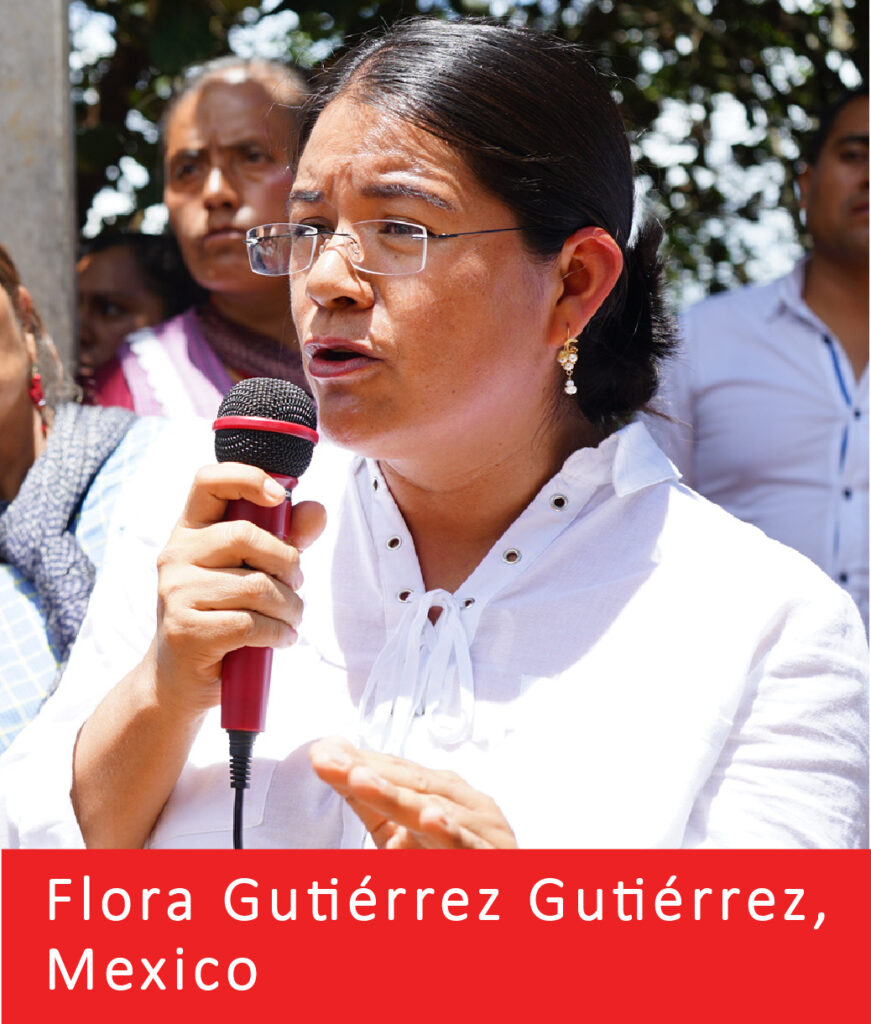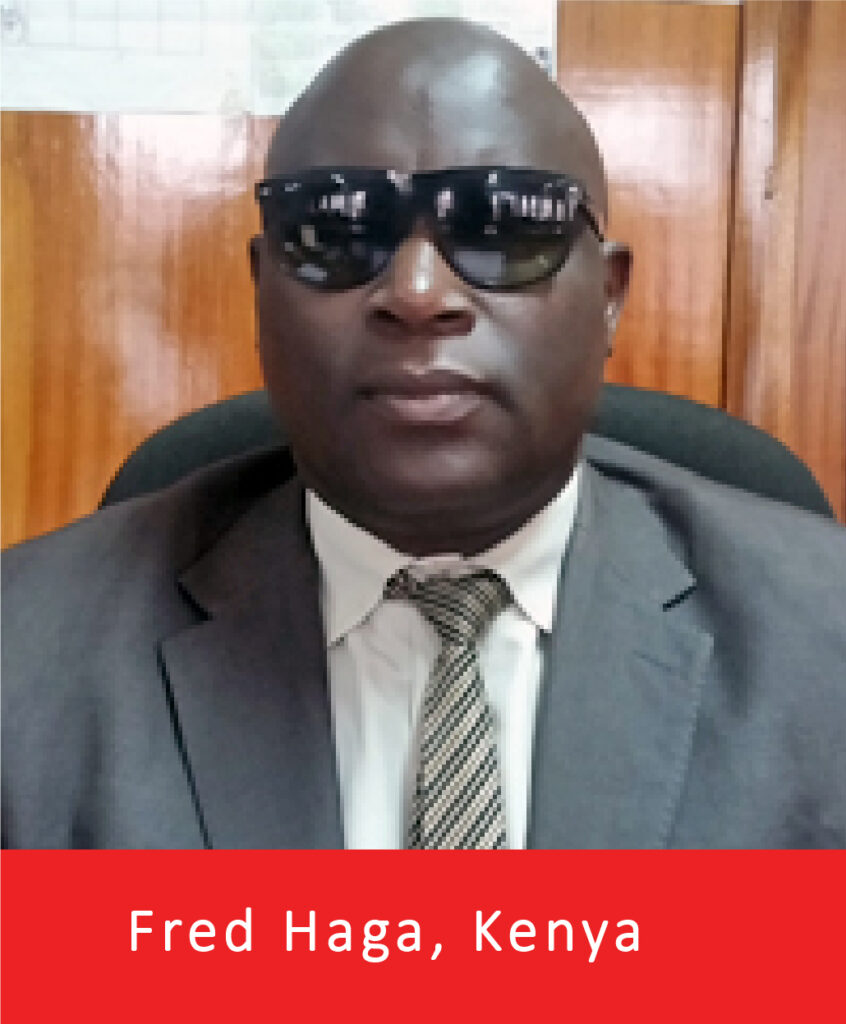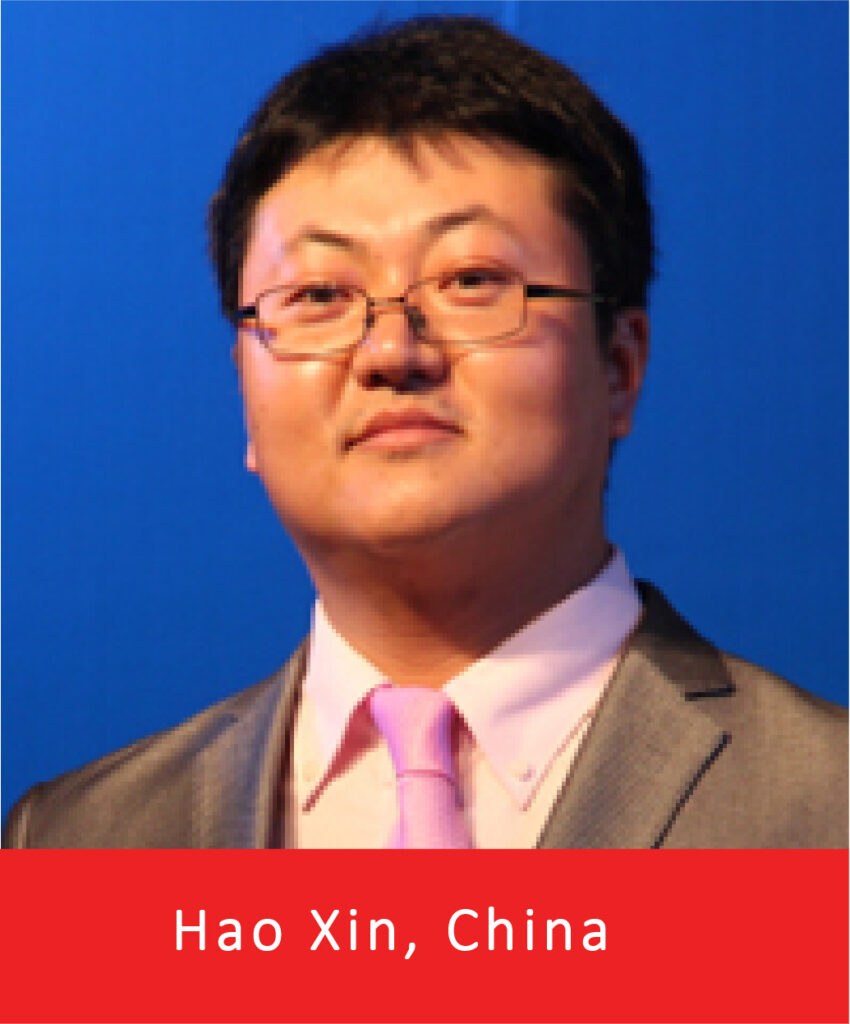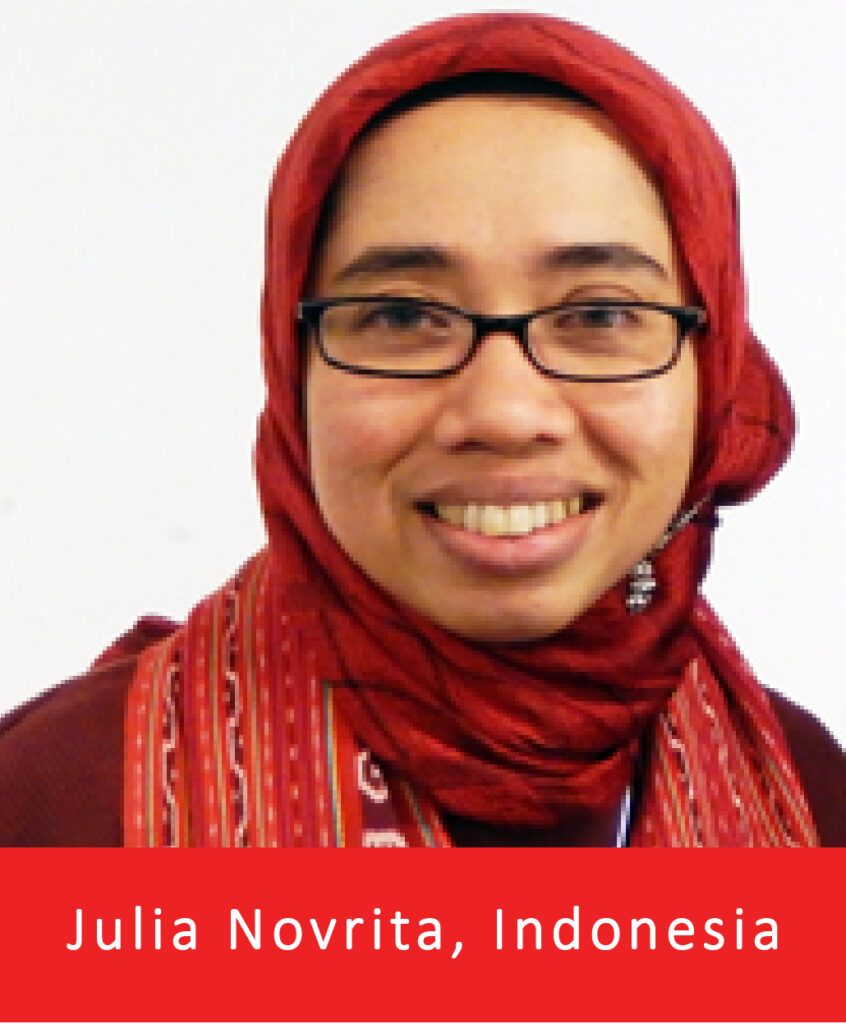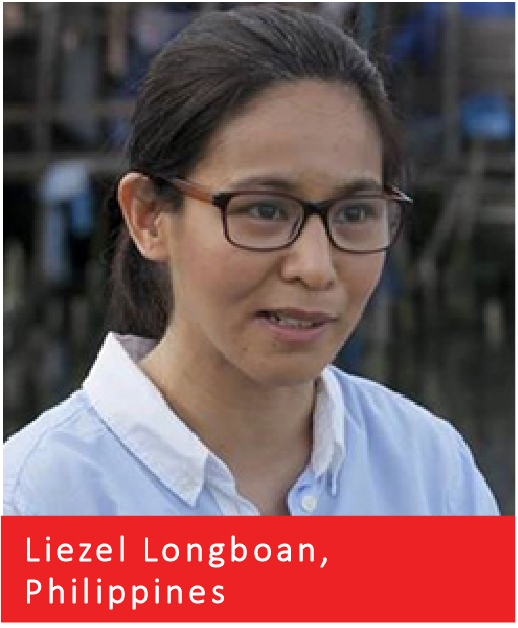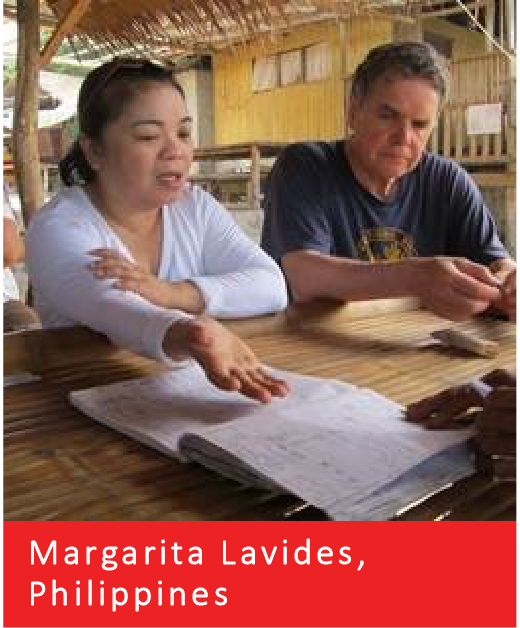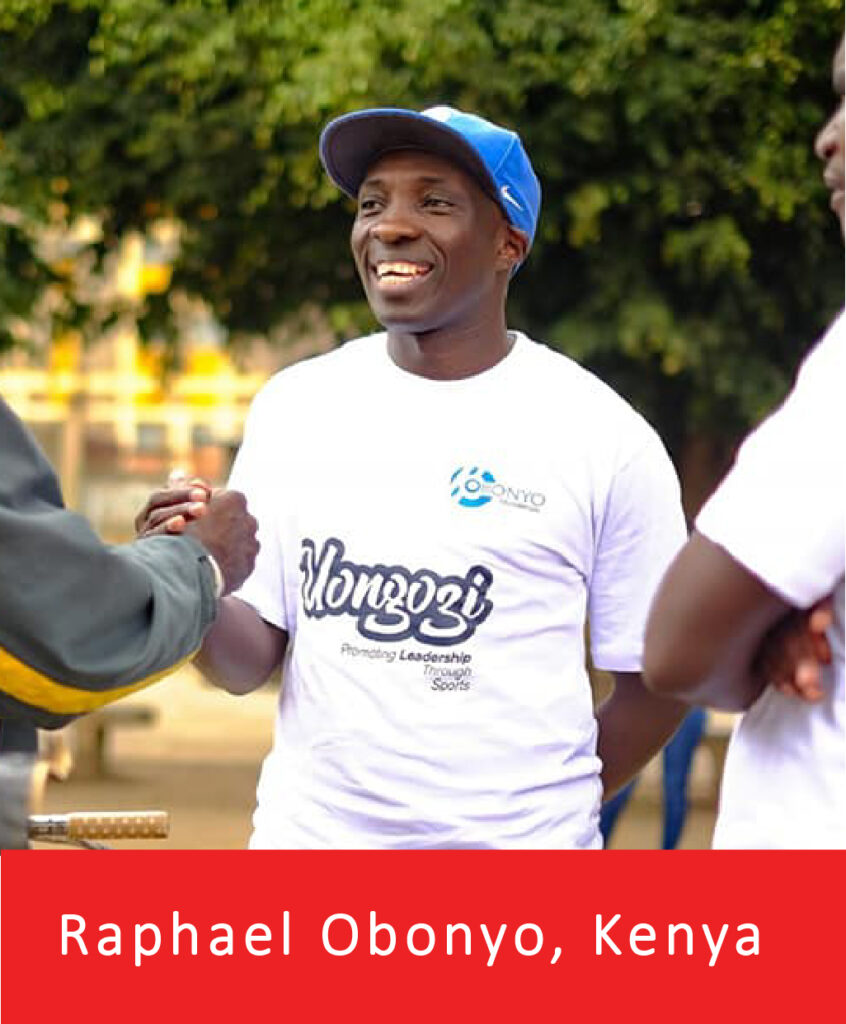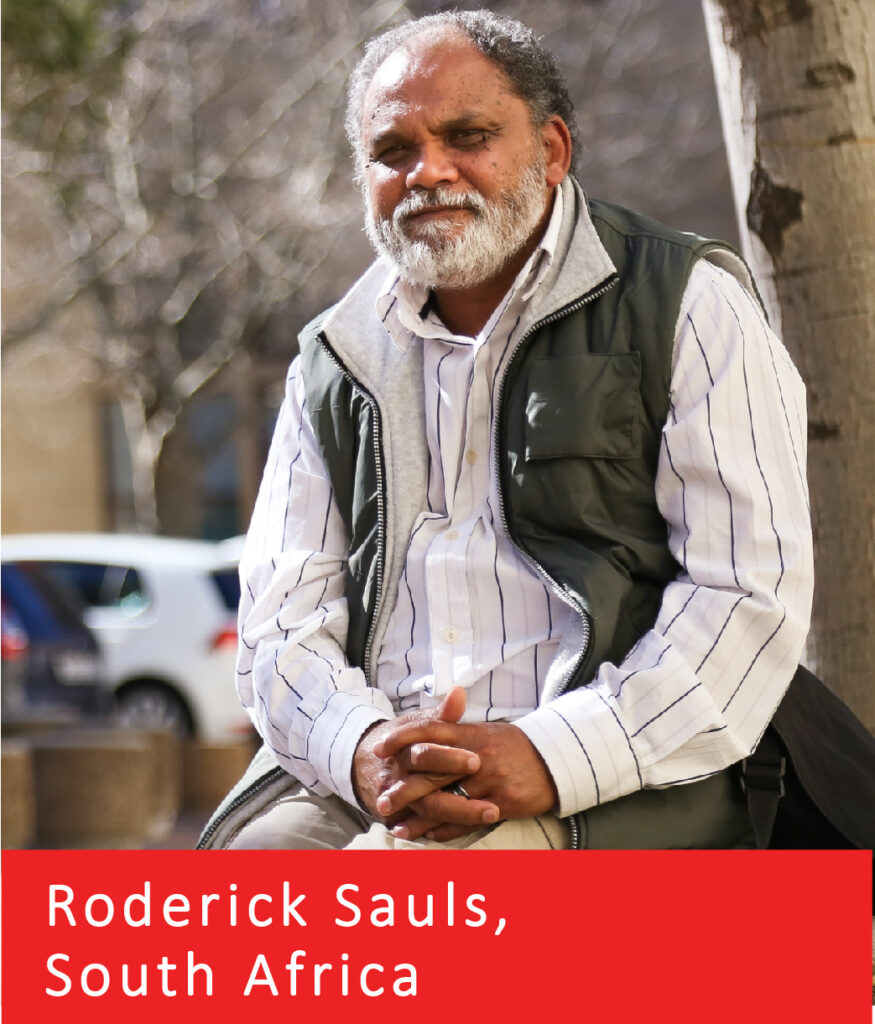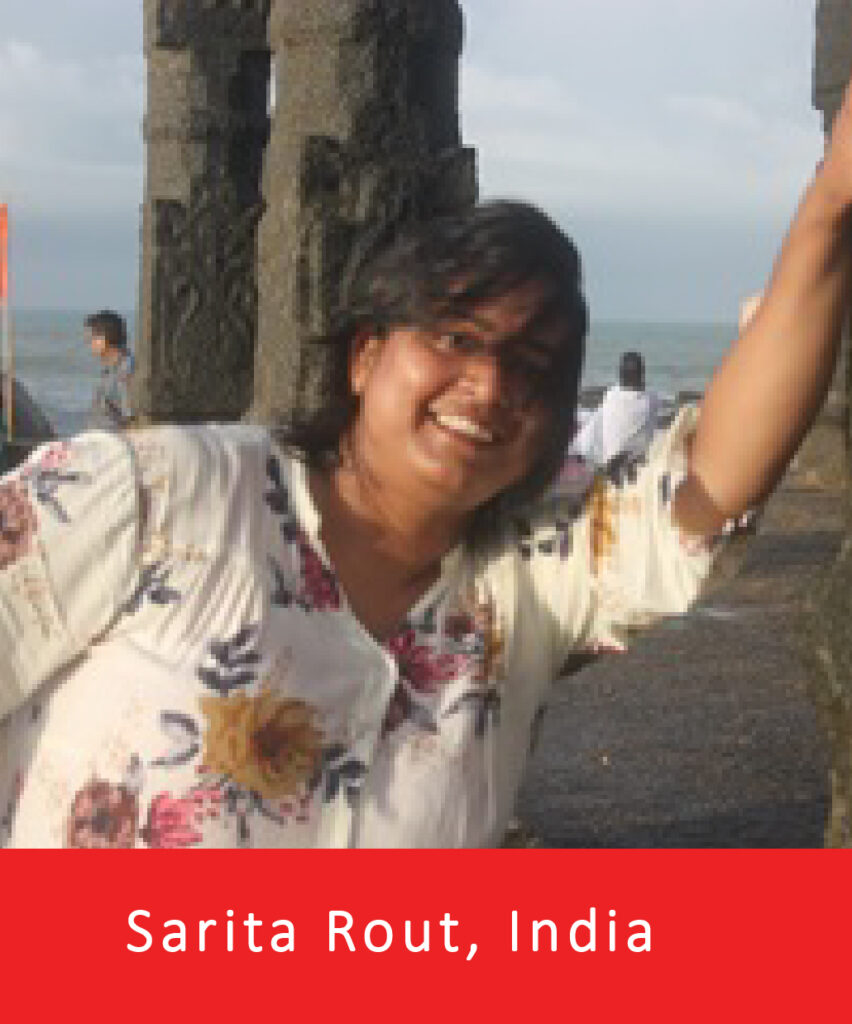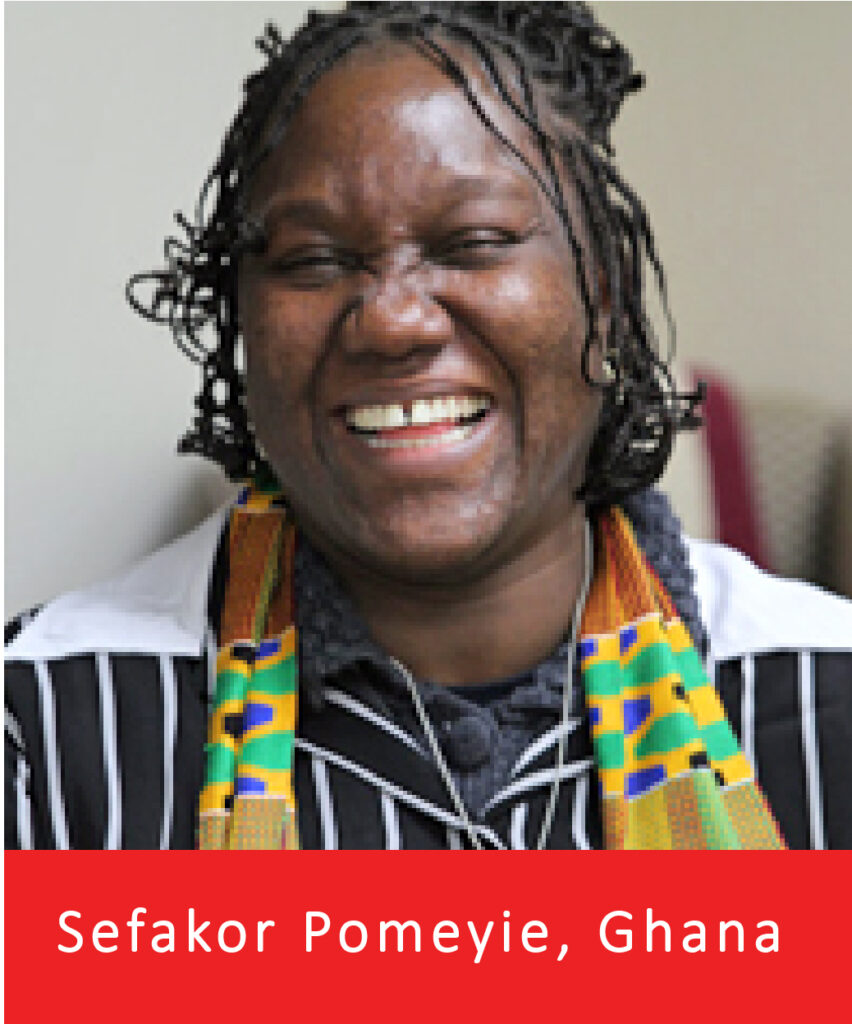In addition to the personal and professional impact data that alumni shared through the IFP Tracking Study surveys, we engaged directly with alumni to gather their stories in longer form through profiles of professional success and deep commitment to social change in their home communities.
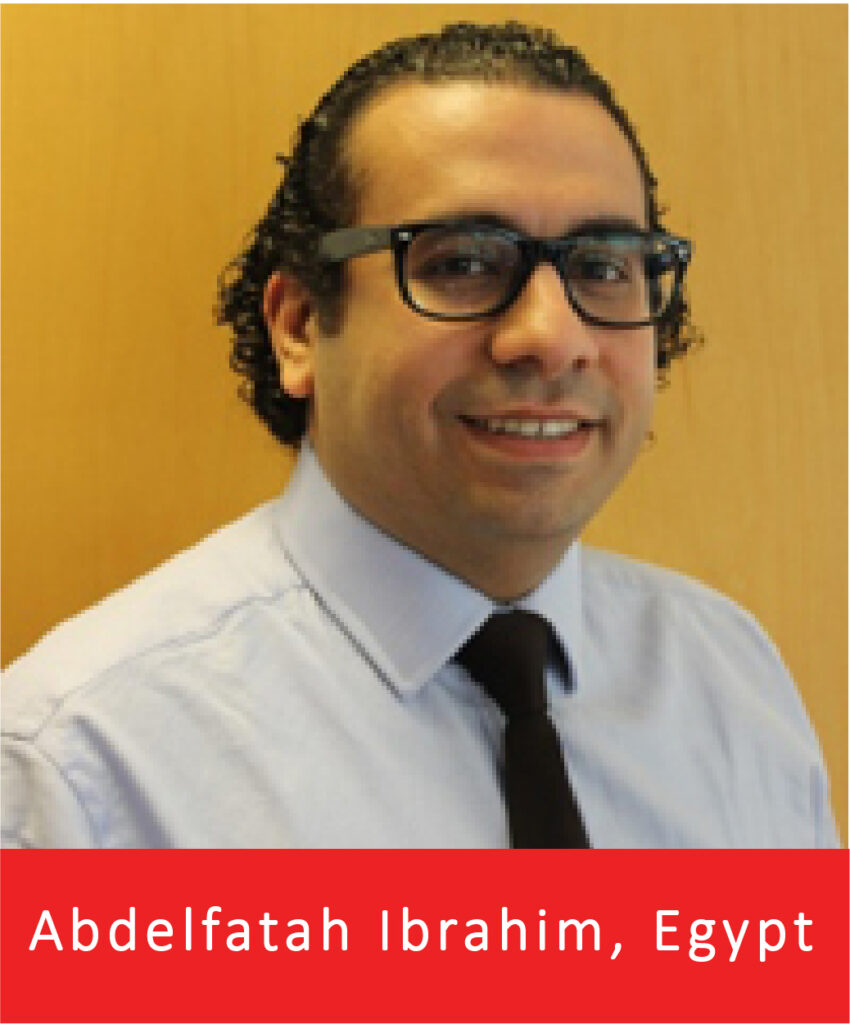
IFP Fellow 2011–2012 | Master’s in International Development, University of Birmingham, United Kingdom
Background and Motivation
Growing up in Cairo, Abdelfatah Ibrahim always felt that something was inherently wrong about the inequality in his community. After working at some international aid agencies in Cairo, Abdelfatah received an IFP fellowship to complete a Master’s in International Development with a pathway in Poverty and Inequality.
We spoke with Abdelfatah about his background, his fellowship experience, and his work and interest in disability and development. The conversation has been edited and condensed for clarity.
IFP Experience: Professional and Personal Impact
I worked for a number of years in the international development area, and I felt I wanted to learn more about how it is accomplished. Since my bachelor’s degree was in tourism, it wasn’t easy to advance my career and the public universities did not have a graduate program in international development that I can apply for, meanwhile the private universities were way too expensive for me to afford. I was looking for a fellowship when I saw the opportunity with IFP and I thought well I’ll do my best and apply for this. Ultimately, I wanted to know more about this field, advance my career, and do something for my community.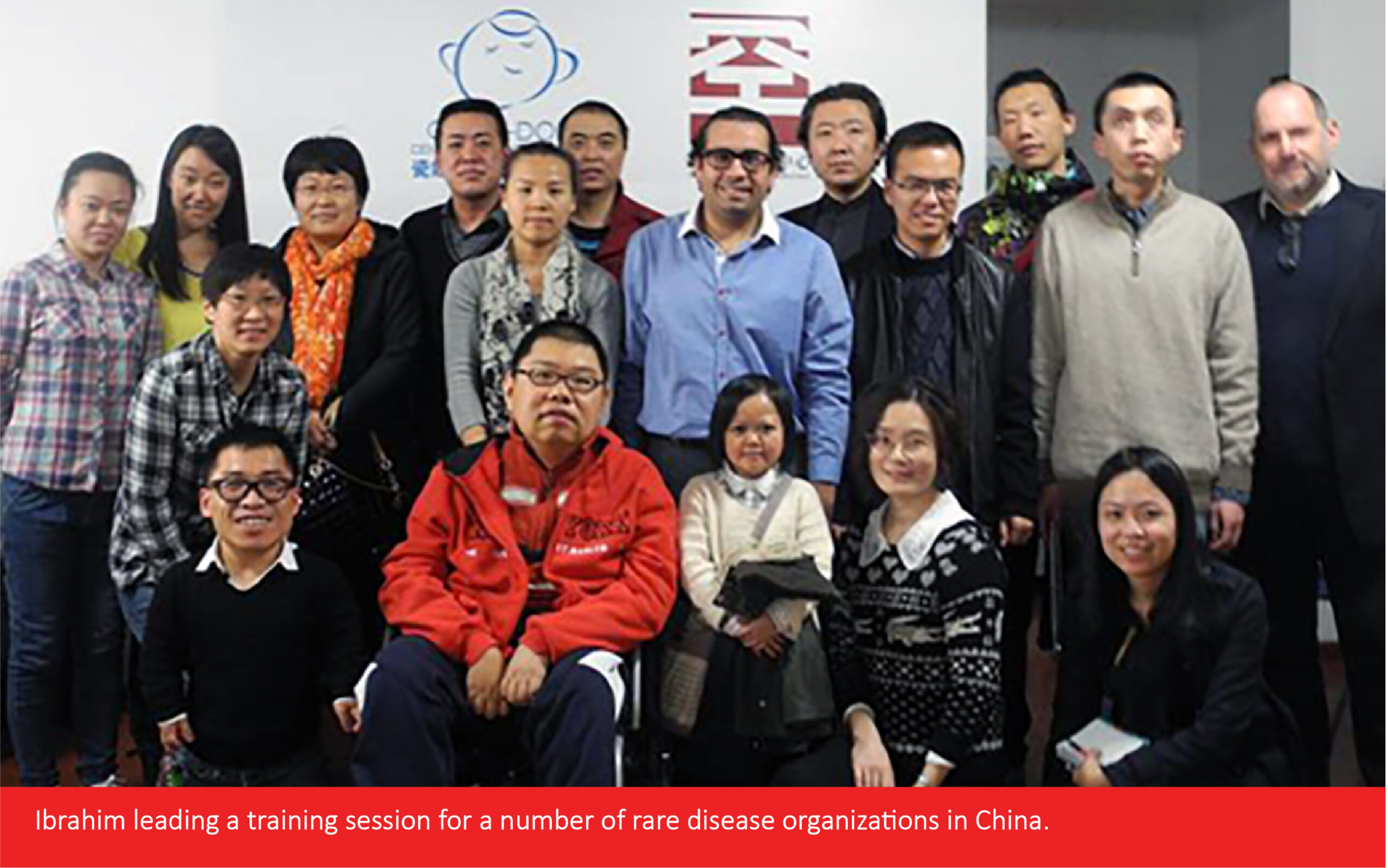
I studied International Development at the University of Birmingham with a pathway in Poverty, Inequality and Development. It was difficult to choose one pathway, because there were so many areas of interest, but I felt the most passionate about poverty and inequality discrimination issues. I studied socio-analysis and interventions in poverty and inequality, some theoretical topics, and also some more technical stuff including project management. Why did poverty and inequality pique your interest? Well, I come from country where the poverty level is quite high. Additionally, policies in my country have widened the gap between the rich, middle and poor. I have always felt it was wrong that there are slum areas where people cannot afford basic living expenses next to very modernized and wealthy areas in Cairo. What are you doing now – have you returned to Egypt or remained in England? I have not returned to Egypt. Actually I was offered a job in London before I graduated from my Master’s program. I work for an organization that is part of the which works with multiple sclerosis (MS) organizations around the world. I am on the Capacity Building Team, where we work with and support MS organizations in emerging countries to help them develop their skills and better support people with MS on the ground. Often these organizations are patient-led who want to do something for themselves and others, but don’t necessarily have the organizational or development background – which is where my organization comes in.
I believe that inequality – access to treatment, employment, discrimination – it’s all related. I’m still able to apply my skills on inequality interventions – just perhaps with a different target group but the same purpose. Before I aimed to help people in slums in Egypt, now I’m indirectly helping people with MS in the Middle East and China.
Reflections and Accomplishments
There are loads of opportunities to help you study in your home country, but very few that provide a high-quality education like IFP that opens opportunities and gives you the education that will make change happen. I learned a new way of thinking and analyzing the world. I only wish that more people would have this same opportunity to access such a high-quality education. Higher education is essential to allow opportunities for people to access decision-making areas. I am still early in my career and haven’t reached a very influential point yet, but I’m more committed to the international development cause than ever. Without IFP fellowship I would not be able to get my degree in the area I always wanted to learn more about and therefore advanced in my career. 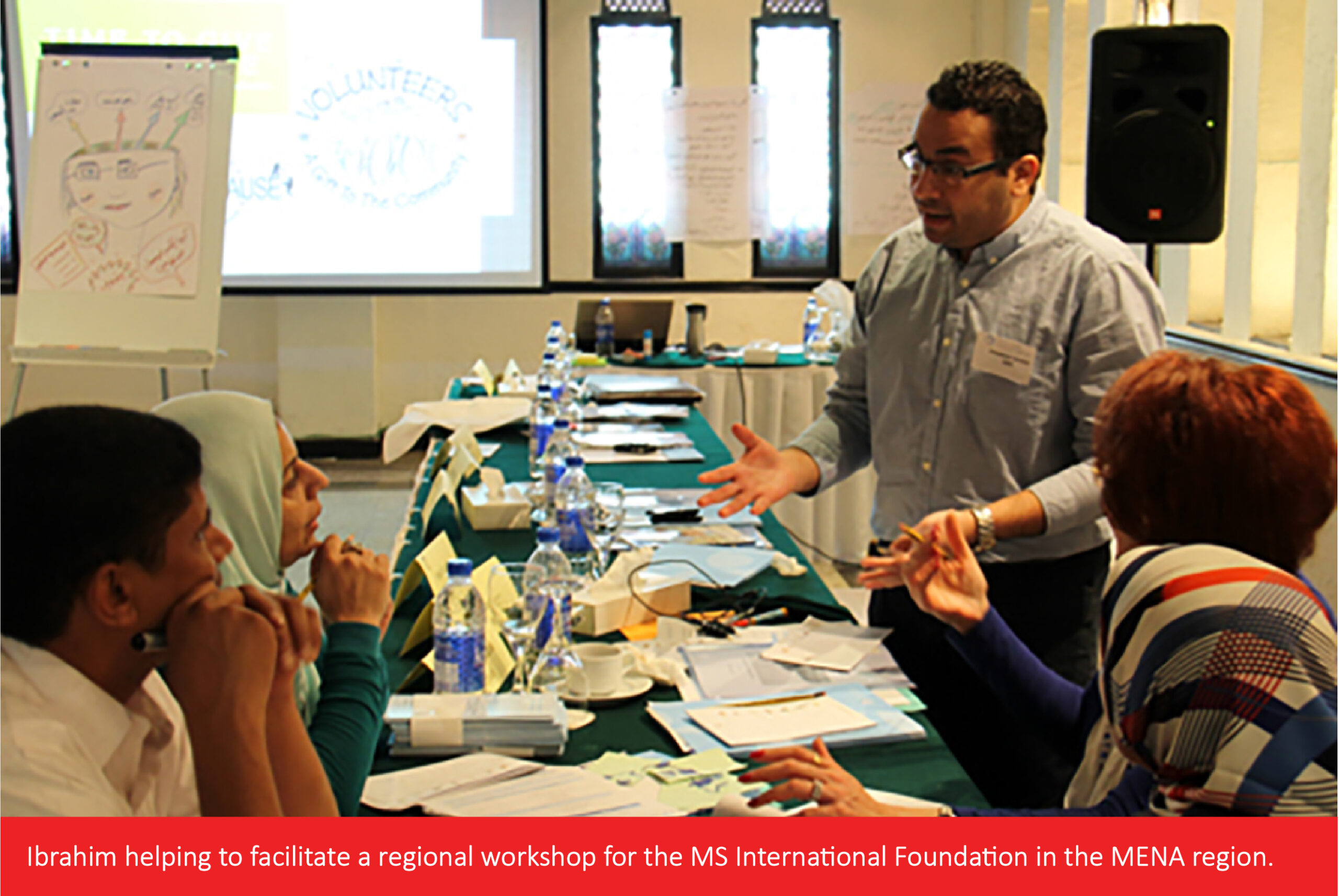
Working with the MS community has brought to my attention this group and wider group of people with disabilities that we often forget about. There is always a massive focus on poverty and inequality, but there are other things, such as disabilities, that overlap with those two issues. So I hope to continue working on disability, poverty and inequality causes.
IFP Fellow 2007–2009 | Master’s in Education (Curriculum Development), Pontifícia Universidade Católica de São Paulo
Background and Motivation
At the time of applying for IFP, I was a lecturer. In addition to my teaching responsibilities, I was deeply involved in youth ministry. I worked to empower young people by providing training and mentorship, fostering their personal and social growth. My commitment to community development extended beyond the classroom, as I actively participated in various initiatives to build a better future for the local community.
Despite my accomplishments, I felt a growing need to deepen my knowledge and skills. This realization led me to explore opportunities for postgraduate studies. IFP presented itself as a promising avenue for advancement. While initially uncertain about my chances of securing the scholarship, especially given the challenges faced by individuals living outside of the capital, I was encouraged by the support and guidance I received from IFP team throughout the application process. I aspired to become a leader in youth promotion and contribute meaningfully to the education sector through teacher training and child development. I was confident that my academic goals aligned with IFP’s mission.
IFP Experience: Professional and Personal Impact
IFP significantly impacted my career trajectory. Upon completing my postgraduate studies, I returned to the Pedagogical University and became actively involved in teacher training for primary education. My contributions were recognized when I was appointed head of an academic department.
The knowledge gained during my postgraduate studies empowered me to take on new leadership roles. I began coordinating and advising various associations and non-governmental organizations focused on early childhood education, particularly for vulnerable children. This involvement opened doors to research collaborations and international events, expanding my professional network.
The knowledge and exposure provided by IFP Fellowship allowed me to pursue doctoral studies, delving deeper into gender issues and women’s access to education. My current position as Director of the Faculty of Arts and Humanity is a testament to the skills and experiences I acquired through IFP. It has equipped me to take on increasingly challenging leadership roles and contribute meaningfully to the field of education.
Reflections and Accomplishments
IFP Fellowship expanded my professional network. I had the opportunity to collaborate with IFP Fellows on research projects and academic events. It equipped me to actively advise and lead initiatives focused on youth leadership, education access, and social welfare.
Beyond my academic pursuits, I dedicated myself to promoting equal access to education, particularly for women, in my city and province. Witnessing my work’s positive impact on young people is a source of great pride. Seeing them take on leadership roles in various sectors of society reinforces my belief that IFP has a lasting legacy. The seeds sown by IFP Fellowship will continue to nurture and transform minds, individuals, communities, and society as a whole.
IFP Fellow 2008–2009 | Master’s in Education, University of East Anglia
Background and Motivation
As a third daughter in a middle-class family, I faced unique challenges due to the societal preference for sons in many parts of India. But despite this, my father championed my education, believing it was the key to success. This motivated me to excel academically, earning several awards and scholarships throughout my schooling.
Unfortunately, my father’s severe illness during my eighth-grade year presented a significant obstacle. My mother, a homemaker, was left to raise four children. I stepped up, taking on various responsibilities to maintain our studies. While continuing my studies, I began tutoring to support my family financially. I encouraged my mother to resume her studies, after completing her higher secondary education, she secured a clerical job, offering us some financial stability.
Overcoming these challenges, I completed my undergraduate studies, started working as a primary school teacher, and later became a teacher trainer, where my innovative approaches gained recognition and were published.
While my success encouraged some relatives to prioritize education for their daughters, I yearned to explore new horizons and inspire others beyond my immediate circle. This motivated me to pursue higher education through IFP.
IFP Experience: Professional and Personal Impact
IFP significantly broadened my perspective in several ways. Firstly, I established valuable international connections. Secondly, my understanding of caste, language, and cultural diversity became more nuanced and inclusive. Finally, I developed the confidence and skills to motivate others and advocate for social change.
Currently, I focus on raising awareness about gender-related issues and international educational trends. IFP experience not only broadened my intellectual horizons but also fueled my pursuit of a Ph.D. in England. This journey further empowered me as a motivational speaker, writer, and thought leader. Today, I serve as a member of the State Resource Group, working to enhance the quality of education in Uttar Pradesh, India.
Reflections and Accomplishments
The knowledge and skills gained during my IFP experience at the University of East Anglia and interactions within the program continue to guide my work in India’s education sector. I am equipped to initiate innovative approaches, conduct research, and analyze educational and social challenges.
I feel a tremendous sense of pride from the impact I make as a teacher, a member of the State Resource Group, and a motivational speaker. My work contributes to creating better schools, communities, and a society that offers equal opportunities for all, regardless of social background. Ultimately, I encourage people to live lives filled with dignity and purpose.
IFP Fellow 2005–2008 | Ph.D. in Food Science, Oklahoma State University
Background and Motivation
I belong to the Sasak tribe/Lombok tribe from my father’s side and Java tribe from my mother’s side. Two decades ago, I was a single mother with modest means, working as a young lecturer at the University of Mataram in Indonesia. With just a master’s degree, my career advancement opportunities were limited. I aspired to pursue a doctoral degree but encountered obstacles due to my junior position and limited English proficiency.
Several factors motivated me to apply for the Ford Foundation International Fellowships Program. First and foremost, I sought financial independence. My mother always said that education is the key to breaking the cycle of poverty, and I believed that earning a doctorate could be my way forward. Second, IFP stood out as an incredibly generous scholarship program, unlike others I had encountered, which often required advanced English proficiency even before selection. It offered language support and training to its scholars, making it an inclusive option for someone like me. Third, IFP Fellowship was unique in its global approach, allowing scholars to study in any country, unlike other programs that restricted opportunities to specific nations. Finally, I aspired to become a role model for Sasak women. I wanted to show that women could excel in higher education, develop leadership skills, and contribute to society in ways traditionally dominated by men. I envisioned speaking confidently in international forums, advocating for women’s empowerment and rural development.
IFP Experience: Professional and Personal Impact
Receiving IFP Fellowship to study in the United States fundamentally transformed my life, professionally and personally. One of the most profound changes was my newfound appreciation for cultural, religious, and racial diversity. At Oklahoma State University (OSU), I formed close friendships with individuals from all over the world, learning about different cultures, religions, and beliefs. This exposure instilled in me the values of tolerance and mutual respect.
Beyond the ability to embrace diversity, I also developed resilience. The challenges of pursuing a doctoral degree abroad strengthened my determination and perseverance. I developed strong managerial skills, time management abilities, and the ability to adapt to new environments, preparing me for greater responsibilities in my professional life. IFP experience also fostered gratitude and empathy, inspiring me to contribute to solving social problems.
The comprehensive support from IFP, from English preparation in Jakarta to ensuring alumni were well-positioned in their careers, was genuinely motivating. The impact of IFP extends beyond personal growth. It has empowered me to make a positive contribution to society.
Reflections and Accomplishments
Upon returning to Indonesia after completing my Ph.D., I became Vice Dean of the Faculty of Food Technology and Agroindustry at the University of Mataram. During my tenure, I have played a crucial role in rebuilding the faculty after the devastating earthquake in 2018, ensuring the continuity of education, administration, and staff welfare services. My leadership skills and ability to navigate challenging situations led to my appointment as Dean of the faculty in 2020, becoming the first female leader of the faculty and one of only two female leaders at the university at the time. This achievement is one of my proudest moments—it challenged the prevailing norms that favored men for leadership positions. It proved that women could lead and excel in higher education and set a new precedent for future generations.
As a leader, I have been instrumental in advancing education at the faculty level. I have been involved in crucial decision-making processes, promoted gender equality in leadership positions, and inspired students to pursue higher education. I am particularly proud of my role in motivating female students and breaking down barriers that traditionally hinder their progress. My journey inspires others, demonstrating that women can excel in academic and leadership roles. IFP has truly empowered me to serve my community and contribute to the betterment of others. It has been a transformative experience that has shaped my career and my life.
IFP Fellow 2009–2010 | Master’s in International Studies in Education, University of Birmingham
Background and Motivation
Since graduating from the Faculty of Education in Egypt in 1994, I’ve been passionate about supporting children’s education in my local area. Poverty, tribalism, and a lack of awareness about human rights – particularly child and women’s rights – contribute to poor learning outcomes. I firmly believe that education is critical to improving people’s lives everywhere and that quality education is the path to a better future.
The Ford Foundation International Fellowships Program (IFP) appealed to me as a gateway to studying educational policies. I saw it as an opportunity to gain new perspectives on education, explore diverse approaches, and develop myself professionally. I wanted to break out of my comfort zone, expand my knowledge, and ultimately use my learnings to improve education in my community.
IFP Experience: Professional and Personal Impact
The Fellowship wasn’t just about travel and study – it was a journey of self-discovery. My perspective broadened significantly. I learned to think more critically, develop stronger analytical skills, and cultivate empathy. This newfound awareness motivates me to be a positive force for change, both globally and within my local community.
I realized that change is a gradual process. It’s about working collaboratively and empowering others. During the Fellowship, I likened it to transitioning from a small village to a bustling city – a significant shift. Just as I left my comfort zone in Egypt to pursue a Master’s degree in the UK, I shed some of my old beliefs and embraced new perspectives.
Exposure to diverse cultures, people, and academic resources equipped me with the latest knowledge, research tools, and leadership skills. I discovered my ability to lead and make informed decisions, as well as a passion for academic research. Witnessing the importance of good management in education, I became convinced that effective leadership and research-driven reforms are vital for progress.
Reflections and Accomplishments
My IFP experience focused on studying educational leadership, negotiation, educational inquiry, human rights, system reform, and challenges to implementing educational policies. After completing my Master’s degree, I leveraged my new skills by taking on a senior supervisory role in my local education zone. This allowed me to share my experiences with other educators. I facilitated training programs for teachers and supervisors, implemented educational planning initiatives, and provided educational consulting services to improve learning outcomes.
I am very proud of my work at my local education zone. I am a trusted resource not only for young pupils but also for the teachers. Additionally, I am an accredited mentor coach with the Regional Office for English and the American Embassy in Cairo.
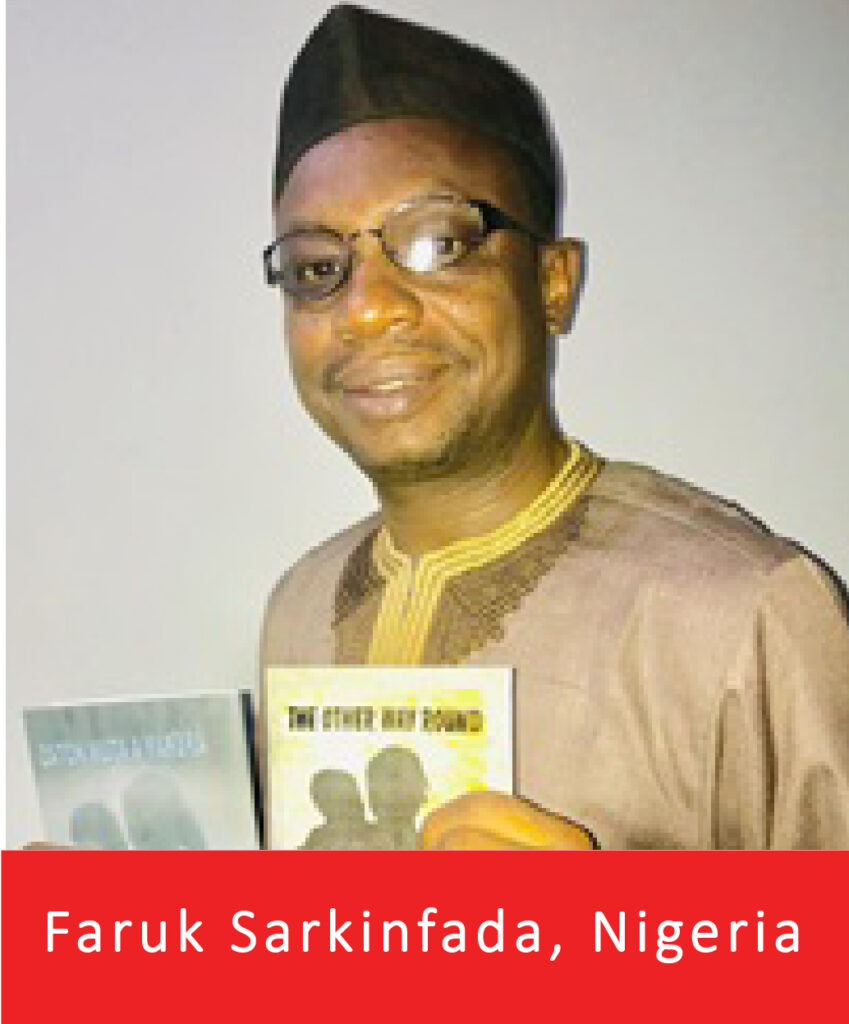
IFP Fellow 2004-2007 | Doctorate in International Public Health, University of Liverpool, United Kingdom
Background and Motivation
As a public health laboratory professional, Faruk Sarkinfada focuses on how his services can extend beyond the laboratory and hospital and have an impact on policy and social justice.During his IFP supported PhD program in International Public Health at the Liverpool School of Tropical Medicine, University of Liverpool in the United Kingdom, Faruk published research on improving tuberculosis and malaria diagnostic services and provided guidance for public health policy makers in Kano State, Nigeria. Faruk’s research informed the design and implementation of the Community Diagnosis Project (CDP) that sought to improve diagnostic systems and outreach, impacting around 1,000,000 people throughout parts of Nigeria. This experience empowered him to serve as the national diagnostic consultant in both the tuberculosis and malarial control programmed of Nigeria in his post IFP career.
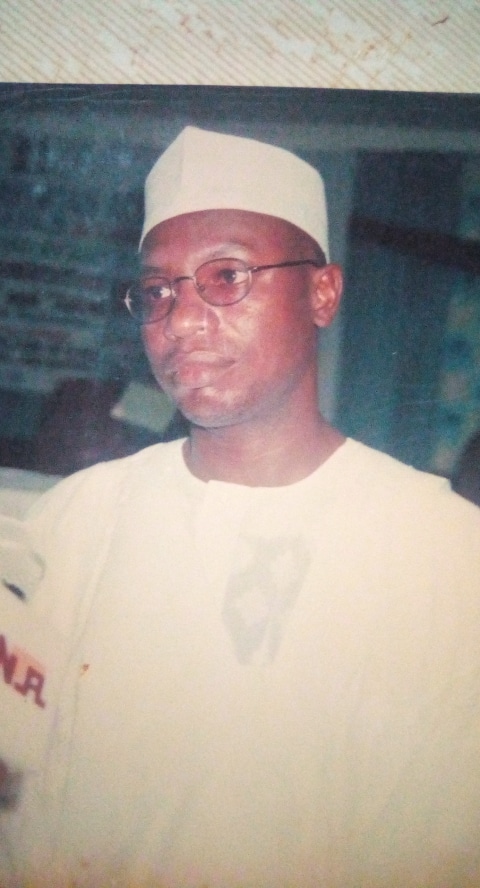
IFP Experience: Professional and Personal Impact
Because of his IFP experience, Faruk believes that equal access to educational resources is fundamental to sustainable development and social justice advocacy, particularly in parts of his home country of Nigeria. Despite having a “sound base for Islamic education” in Northern Nigeria, “the region is relatively disadvantaged in terms of basic education, contributing to a high number of out-of-school children” largely because of grossly inadequate support to the education system and the educational resources available to them are in English, rather than their local Hausa language. This dynamic has perpetuated many of the beliefs and harmful traditional practices that negatively affect public health issues, such as communicable disease burden, female genital mutilation (Yankan gishiri) and Vesicovaginal Fistula (VVF). To curb this social injustice, Faruk has attempted to expand access to literature, science, and technology in the Hausa language.
“Language barriers pose a great challenge to the understanding of science and technology education, particularly among Hausa speaking communities in Northern Nigeria. There is an urgent need for agenda setting to actualize the goals of expanding access to science and technology in Hausa if we are to tap into the energy, entrepreneurship, creativity and intelligence of our people.”
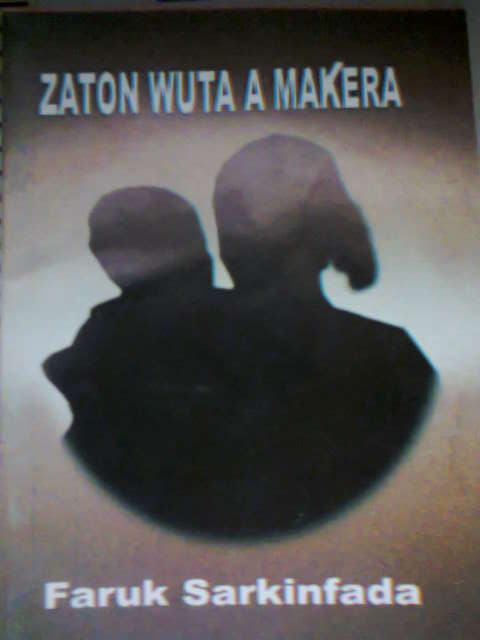
Reflections and Accomplishments
Faruk has sought to improve access to public health knowledge and resources by authoring several books, songs, and poetry that are often featured on Nigerian TV, radio, and in educational programs. His most publicized book, The Other Way Round and its Hausa version, Zaton Wuta A Makera, challenges the beliefs surrounding female genital mutilation and clarifies the causes and preventative measures of VVF. Faruk has also written Bakandamiyar Sarkinfad, a collection of Hausapoetry used in Nigerian schools, and Wakar Cimar Abinci, a Hausa song describing the value of certain nutrition and classes of nutrition. His recently published book, Wani Abu A Kan Matar Sarki, is the first science fiction in Hausa depicting public health issues on the causes, and preventive measures of communicable diseases. In addition to these products, Faruk established the Foundation for the Development of Science and Technology in Hausa Language and has been honored by the Association of Nigerian Authors.
Faruk is currently Professor of Medical Microbiology in the College of Health Sciences at Bayero University in Nigeria and Associate Professor of Health Sciences at Khawarizmi International College, Abu Dhabi, United Arab Emirates. He is also a member of the International Ford Foundation Programme Alumni of Nigeria where he previously served as President.
Photos courtesy of Faruk Sarkinfada. Information compiled by Hayden Murray, May 2019.
Background and Motivation
Originally from a remote indigenous community in the Zapoteca region of Oaxaca, Flora’s family struggled with poverty throughout her childhood. Although she helped her parents farm from a young age, had little to eat, and walked far to school, Flora studied diligently. Her interest in women’s rights is rooted in her father’s encouragement to study hard; he wanted his children—even his daughters—to get an education and have a better life than he did. Growing up, Flora became more aware of everyday gender inequities affecting indigenous communities, like the fact that women were not allowed at her community’s basketball court. By secondary school, she knew she wanted to study law “I realized since then that some things were not OK,” Flora recalled “But I did not know how to respond to such situations I was young.”
IFP Experience: Professional and Personal Impact
Following her IFP fellowship, Flora returned to Oaxaca and helped establish and lead several indigenous lawyers’ networks, from the localized Zapotecas and Chatinas Women Alliance of the South Mountains, to the nationally-oriented Indigenous Female Lawyers Network with members in other Mexican states Flora offers workshops that teach indigenous women about their electoral and human rights and provides legal consulting, combining gender and indigenous perspectives. Flora’s fellowship reinforced her commitment to indigenous women’s rights and prepared her to discuss broader human rights and social justice issues“ Without the scholarship, it would have been harder for her to organize us” said a colleague from Women Weaving Realities, another network that Flora helped establish, which serves as a bridge between the people and the government “I see her more secured, empowered, and more convincing with certain things.” Empowered by the scholarship, Flora has in turn enabled others with a can-do attitude “She helps a lot,” said a woman who has benefited from Flora’s activism “She is always willing to help, she always said, let’s do this.”
Background and Motivation
Fred Haga grew up primarily in Nairobi, Kenya. In high school, Fred lost his vision, forcing him to drop out. After 7 years out of school, he finally found a school willing to let him complete high school. He went onto obtain an undergraduate degree in education; a choice that he believed would help him improve the circumstances for disabled children in Kenya. Fred later received a Ford IFP fellowship to complete his Master’s in Special Needs Education from Monash University in Australia. Through his current position in the Ministry of Education in Kenya, he recently had the opportunity to complete a fellowship program at the Perkins School for the Blind in Boston, Massachusetts.
We spoke with Fred about his experience being visually impaired in Kenya, and his dedication to improving disability rights and curriculum for visually impaired children in Kenya. The conversation has been edited and condensed for clarity.
IFP Experience: Professional and Personal Impact
After losing my vision in high school, I felt that I needed to do something for children with disabilities. I was not able to raise the funds necessary to do the program here locally. IFP offered me a chance to overcome the financial barrier and support me through my disability. I thought this graduate degree would give me a better opportunity to help other students who are visually disabled.
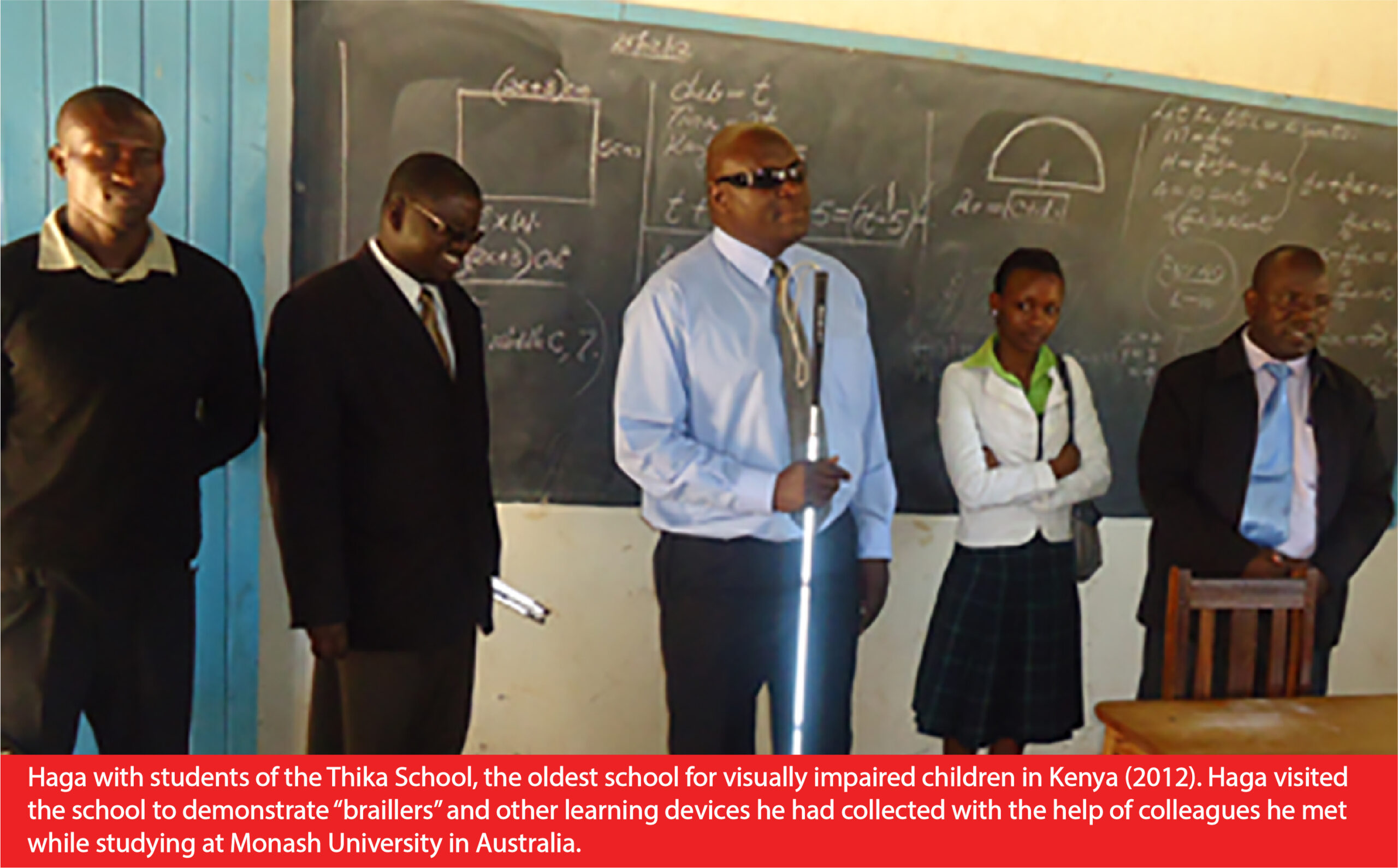
The biggest challenge facing learners with disabilities in Kenya today is that most of the children with disabilities in my country are not in school. So getting them to school is one challenge that we have, and once they get to school, giving them appropriate and relevant intervention programs is another important challenge. Additionally, even if they go to college, there’s a shortage of employment for disabled people, which is another big, big problem.
I have been able to apply any knowledge that I acquired at Monash University to my work at the Ministry of Education in Kenya– one of my current concerns of work is on an expanded co-curriculum that students with disabilities need on top of academic learning. In Australia there is an expanded co-curriculum that we do not have in Kenya. In my position at the Ministry of Education, I am able to talk with teachers and emphasize the need to adopt this expanded co-curriculum. The country is currently reviewing the curriculum and trying to develop a co-curriculum for visually impaired learner that will teach daily living skills, orientation and mobility, social skills, self-advocacy and other related skills.
The fellowship was mostly about coming to Perkins, seeing how they do things, and picking up what could be relevant and adopted in Kenya. I am part of the team that coordinates the education program for learners with a disability. These are three main areas of interest that I’m hoping to take back to apply in my work at the Ministry of Education in Kenya: first, I have learned that those who have multiple disabilities may not be academically inclined, but there are adaptations or modifications that allow the students to complete their education despite their limitations.
The second area that is of great interest to me is the evaluation and assessment of function of disability. To effectively come up with an intervention, you really have to understand the limitations of a student because disability is so varied. So, I’m studying how to do an evaluation to plan for educational intervention, because it’s all based on the need of the child. Back in my country, it’s a one-kind-fits-all sort of intervention which is not as effective.
The third area is the employment of assisted technology, both in education and in the daily lives of people with disabilities. While some of the technology in the US was really high-tech and might be out of the reach of Kenya, there are hosts of other low-cost technologies that would open more opportunities for the students.
I’ve been very involved with the Kenyan Union of the Blind and the African Union of the Blind. We have created employment programs for those who may not have gone on to get a college qualification. I also work with the National Council for People with Disability. We lobby for employment of people with disabilities who have qualifications, college degrees and will be able to get sound employment. When the new constitution was written in 2010, we were able to include a clause that gives a quarter – that’s five percent – of public positions to persons with disabilities. So, we were really happy about that and our work is meant to ensure its implementation.
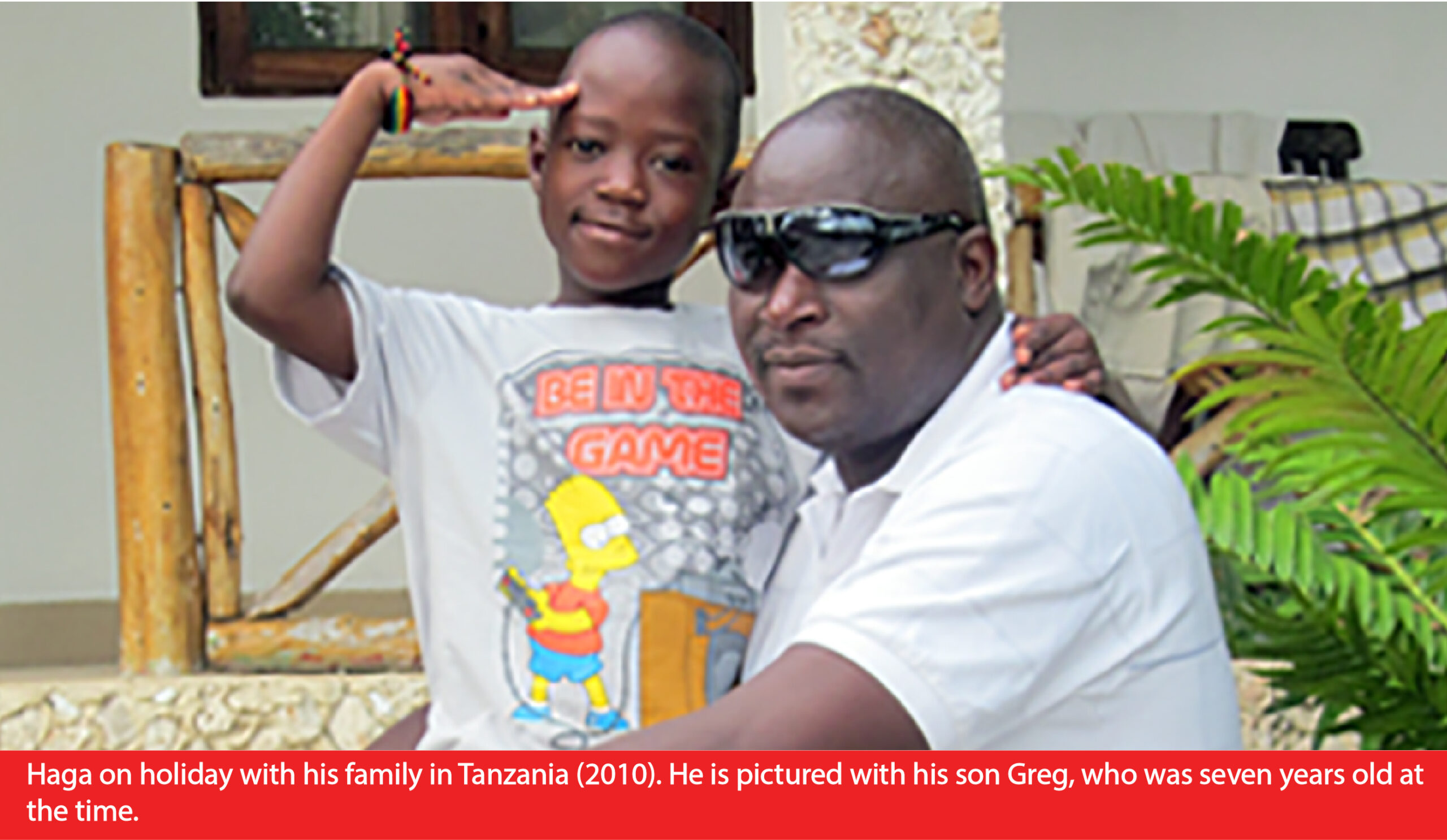
Reflections and Accomplishments
Slowly, but steadily, progress is being made. It’s an attitude issue, and we’re trying to offer people with disabilities more marketable skills so that they’re able to be competitive. The Constitution has made a big difference, because I see more and more people with disabilities now getting positions in the public sector.
I sometimes get invitations to speak to communities because I am an example of somebody who had the opportunity to go to school, to access higher education, and now I’m in a position of influence. So, I talk to people; I talk to them about taking their kids to school, because in my country, kids who have disabilities are often hidden. I am even able to serve as a role model and advise those who have finished school.
I think the fellowship was really a turning point in my life, both at a personal level and at a professional level. In my country, not many people have opportunities to study out of the country. I was able to come back with different stories, experiences, and ways of thinking. I made very important contacts that I still keep today. Now with my current fellowship, I believe I’ll be able to make a contribution professionally and in volunteer work. This fellowship was important for me and I want to believe the Ministry of Education and Disability Rights Movement will benefit from my advice and unique perspective.
In 2024, Fred added additional context in a separate survey.
Background and Motivation
I lost my sight due to glaucoma at age 17, during my third year of secondary school. I dropped out and spent the next seven years at home, unsure of what to do, as there was little awareness regarding disability education in the 1980s in my country. Eventually, I joined a rehabilitation center with professionals knowledgeable in disability education, where I was encouraged to return to school at age 24. However, I often felt out of place due to the 7-year gap between me and my classmates.
This experience led me to resolve that I needed to work in a position or organization where I could ensure that no one else would have to drop out of school or remain out for so long after acquiring a disability. I later qualified for university and graduated with a bachelor’s degree in education, but I sought to study further to specialize in my area of interest. However, saving enough money for higher education was nearly impossible due to multiple obligations.
I often did not qualify for scholarships because of age limitations, as many scholarship criteria excluded older applicants. IFP, without age limit eligibility criteria, was an attractive opportunity that aligned with my aspirations. I was fortunate to receive the fellowship on my second attempt.
IFP Experience: Professional and Personal Impact
IFP experience significantly broadened my understanding of leadership, social justice, and the importance of making a positive impact not only on my community but also on other disadvantaged communities. It also exposed me to a different culture and worldview, fostering a sense of global citizenship. I came to appreciate not only my host country of Australia but also felt a renewed sense of pride in my home country, Kenya.
Through my IFP-supported education, I acquired recognition as a professional educator expert in disability-inclusive education. My studies in this emerging field in Kenya provided me with the opportunity to learn from international practices and implement them in my work in Kenya. This enhanced professional standing led to a management position within the Ministry of Education.
Since then, I have risen through the ranks and now head the Directorate, which has the mandate of coordinating education services for learners with disabilities and other special needs in education. I am now positioned to influence the direction of disability-inclusive education in my country.
Reflections and Accomplishments
As part of the decision-making body in the field of disability-inclusive education, I have the unique opportunity to shape the direction of this sector in my country. My role allows me to influence policies and contribute to the overall development of disability-inclusive education. This is incredibly rewarding, allowing me to apply the knowledge and skills I gained through IFP fellowship.
One of my proudest accomplishments is my ability to inspire and support young people with disabilities. I have been involved in mentorship and public speaking engagements, empowering individuals to realize their full potential. Additionally, I have intervened in numerous cases, similar to my own, providing guidance and support to those facing challenges.
IFP Fellow 2011–2013 | Master’s in International Economics and Finance, Brandeis University
Background and Motivation
Growing up in a rural indigenous community in Guatemala, I early on recognized the power of education to transform my life and my community. My academic pursuits were driven by a deep desire to contribute to the development of my country, family, and community.
I was drawn to the field of agriculture as I witnessed firsthand the challenges faced by smallholder farmers in my region. I believed that through education, I could work to empower farmers to improve their livelihoods and contribute to the overall development of Guatemala.
IFP Experience: Professional and Personal Impact
My IFP experience has been instrumental in my personal and professional growth. My academic degree and the professional development opportunities provided by the Ford Foundation International Fellowships Program have empowered me to be a more proactive force for positive change and inspire others in my community to pursue higher education.
IFP significantly enhanced my English language skills and gave me a valuable academic foundation. These skills have been precious in advancing my career and securing my current position at USAID Guatemala, where I support the agricultural development of my country.
I have had the opportunity to connect with IFP Fellows from diverse backgrounds and learn from their experiences. These interactions broadened my perspectives and strengthened my commitment to sustainable development.
Reflections and Accomplishments
As an Agriculture Specialist at USAID Guatemala, I leverage the economic and financial knowledge I gained through my IFP-supported degree to inform my decision-making. My strong English language skills enable me to effectively communicate with diverse cultures and collaborate with professionals globally to address the development needs of my country.
One of my proudest accomplishments is supporting smallholder farmers through my work. My position allows me to make a tangible difference in the lives of thousands of rural Guatemalans by addressing their specific needs.
Background and Motivation
Hao Xin was raised in the Zhejiang province of China and received a Ford IFP fellowship to complete a Master’s in Environmental Science and Policy at Clark University in the United States. Following his fellowship he returned to Zhejiang to continue his work at Hangzhou Eco-Culture Association, an environmental advocacy NGO he founded in 2000.
We spoke with Hao about his background, meeting former U.S. President Bill Clinton, and his efforts to promote environmental awareness through his NGO. The conversation has been edited and condensed for clarity.
I applied for the fellowship in 2007. At that time I was running my NGO. It was an environmental NGO that works on advocacy and organizing environmental activities. At that time I didn’t have a lot of opportunities to think about further study, and I had some troubles with NGO work in China; it’s not easy to understand the word “NGO” in China. So that was a time I needed to think about what I should do as a next step, and I think IFP was so great. It was designed just for me.
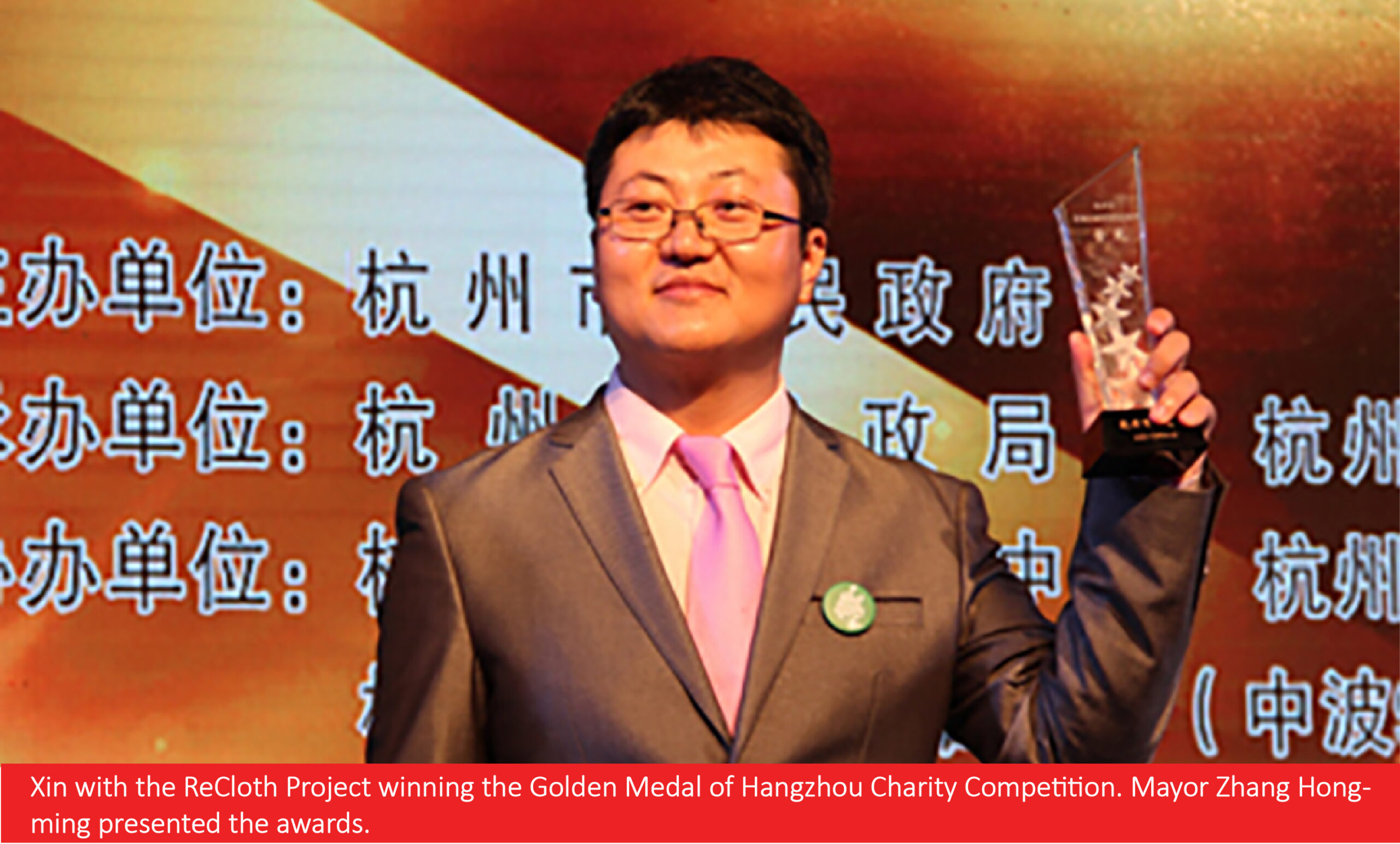
IFP Experience: Professional and Personal Impact
My major was environmental science and policy, which is very relevant to my work. Because my NGO is a local NGO we didn’t have much of an international relationship. So when I was in the States I learned about the Waterkeeper Alliance for the first time, which is an international water advocacy group that has 200 members in six continents in 35 countries.
I just applied for the annual conference in June 2009, and Bill Clinton came to the conference as well and he shook my hand and said, “You did a good job.” For me, it was the U.S. president, the former president, shaking my hand and saying good job. It was an exciting experience. I also met a lot of different environmental soldiers from different continents, different countries. So before the fellowship, I just wanted to be a volunteer for my organization, but after three years in the states, I changed my mind. I decided I should be invested full time in my organization.
So, in 2010 I attended the Waterkeeper Alliance annual conference for the second time, as an interpreter. In the third year, I successfully applied for my organization to be a full member of the Waterkeeper Alliance. The fourth year, I delivered a speech at the conference. 2015 will be my sixth or seventh time to attend the conference. My organization is a leading organization of all the Chinese Waterkeeper organizations.
Reflections and Accomplishments
In 2013, we worked with Zhejiang satellite television and we reported something like 136 times news for water pollution about searching for swimmable waters. Because of this program the head of Communist Party of Zhejiang Province brought a letter to the heads of Communist Party of cities and counties in the Zhejiang Province. He requested that they watch the program and try to work on treating polluted water. And in that year, in July we started a swimmable week in China. We just wanted to use this way to let people understand how important our water quality is. Because of all these efforts, our government now put water treatment as their priority work and conduct a huge project “Five Waters Treatment”, including treating pollution water, preventing flood water, discharging excessive water, providing drinking water and saving water.
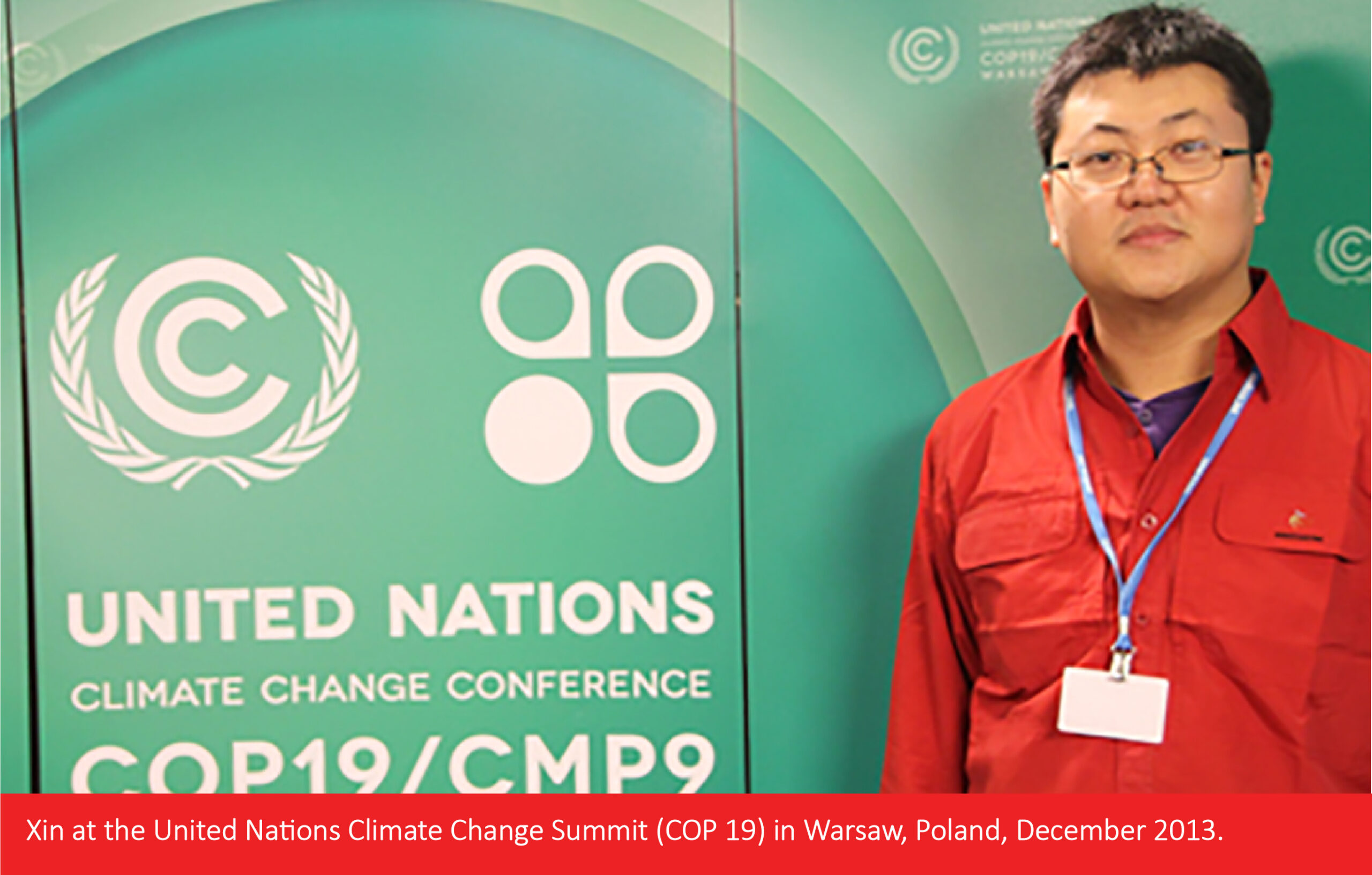
I would say IFP really changed me, changed my life. During the years when I was in States I have seen many different fighters. They are working against pollution. They fight for a green world so it really gives me power and gives me confidence that I can do it as well in my hometown.
We have a lot of work to do and our mission is ‘green more’ with green as a verb because we want more people to be green, from kids to elders, from their daily life to their work, from their home to their office.
IFP Fellow 2009–2010 | Master’s in Law, University of California, Davis
Background and Motivation
Born into a large family of limited financial means, I faced significant challenges from a young age. At four, I contracted polio, resulting in the loss of use of my legs. Without access to a wheelchair, I crawled to school alongside other children, defying the odds and beginning a lifelong struggle for independence. Despite facing discrimination and bullying at school, I excelled academically. With the support of a special education teacher, I was admitted to a rehabilitation home, which provided me with the necessary resources to thrive. I eventually graduated from an elite secondary school with honors and gained admission to the University of Nigeria, Nsukka, to study law.
My university experience was challenging due to the lack of accessibility in the school infrastructure. However, I remained determined to succeed, even venturing into student government politics to advocate for disability inclusion. Unfortunately, my efforts were met with resistance from the university authorities, who refused to swear me in for a leadership position.
After graduating, I worked with the Federal Ministry of Justice in Abuja for four years. I then applied for IFP fellowship, aiming to pursue postgraduate education in a developed country that would enhance my skills and broaden my horizons. Through IFP, I sought an environment where my self-confidence and dignity would not be compromised.
IFP Experience: Professional and Personal Impact
IFP significantly boosted my self-confidence and reinforced my commitment to advocating for the rights of persons with disabilities. I have been instrumental in the passage of the Discrimination Against Persons with Disabilities (Prohibition) Act 2018 and establishing the National Commission for Persons with Disabilities in Nigeria.
Before IFP fellowship, I had focused on a career in the civil service. However, my IFP experience inspired me to pursue a development and community leadership path. I am currently involved in various community development and leadership management boards in my community.
Reflections and Accomplishments
I have held leadership positions in my community and the Association of Persons with Disabilities. Additionally, I founded the nonprofit organization Bamboo Gate Initiative and serve as the National President of the Association of Lawyers with Disabilities in Nigeria.
I am proud to have contributed to the advancement of disability rights in Nigeria through my involvement in legal advocacy and community initiatives. My experiences have shaped my life story and provided me with immense confidence and dignity. Aided by my IFP experience, I have had the opportunity to make a positive impact and contribute to a more inclusive society.
IFP Fellow 2003–2004 | Master’s in Educational Administration, Pontificia Universidad Católica de Chile
Background and Motivation
My journey into the field of education, where I first developed as a high school teacher and now serve as a professor at the National Pedagogic University of Mexico, began in a context where the teaching profession was, and still is, undervalued and even despised. In the 1990s and early 2000s, being a teacher in Peru was challenging and perilous. The anti-terrorism law became a tool for the dictatorship to persecute and imprison educators who opposed the regime. Like thousands of other teachers, I, too, experienced the horrors of abduction and confinement in the clandestine cells of a military base. I was more fortunate than many others in that I survived.
Amid this dangerous environment, I sought opportunities to pursue graduate studies abroad. Rather than lose hope, I held on to education as central to my identity as a person and teacher. When I discovered the Ford Foundation International Fellowships Program, it became my goal to pursue this scholarship opportunity for graduate studies and a safer environment.
IFP Experience: Professional and Personal Impact
IFP transformed my life, opening doors to a world that seemed distant and impossible for a rural teacher. It propelled my academic and personal journeys in unimaginable ways—not only provided access to advanced academic training in a secure environment but also allowed my wife and son to join me on this educational path, which we continue to travel together.
Thanks to IFP, I was admitted to a Master’s in Educational Administration at Pontificia Universidad Católica de Chile. This initial achievement led to my doctoral studies in Pedagogy at the Universidad Nacional Autónoma de México (UNAM), funded by the Mexican Ministry of Foreign Affairs. UNAM marked a significant new chapter in my life, which continues today in my role as a professor at the National Pedagogic University of Mexico.
Beyond my academic achievements, IFP Fellowship has provided me with invaluable opportunities for personal and professional growth. I had the unique opportunity to engage with Peruvian fellows from various professions and regions, interact with peers in Chile, and connect with IFP Fellows from across the world at the Institute for Leadership for Social Justice in Oaxaca, Mexico. These interactions fostered a rich exchange of ideas, broadened my network, and enriched my understanding of diverse perspectives.
Reflections and Accomplishments
My journey has been deeply intertwined with my passion for education. I take pride in the fact that, despite facing persecution and danger, my family and I survived extremely difficult situations, including abduction and imprisonment. Rather than being defeated by these challenges, I sought opportunities to continue my education and improve our lives. Scholarships such as IFP opened the door to me for prestigious graduate programs in Chile and Mexico.
I am particularly proud of my involvement in projects that train future teachers from a community perspective and my contributions to teacher training and professional development research. These endeavors have been instrumental in shaping my career and making a positive impact globally.
Background and Motivation
Julia was raised in a village community in Aceh, on the northern tip of the Indonesian island of Sumatra. Growing up, Julia was exposed to the types of conflicts that plague many parts of Indonesia, experiences which influenced her studies and career path. Since completing her Master’s, Julia has been working to strengthen the provision of education in Indonesia through InDev, an NGO she co-founded that seeks to strengthen the capacity of community groups, NGOs, governments and education institutions through training, research, and consultancy. Julia is also currently pursuing her PhD in International Education at the University of Massachusetts Amherst.
We spoke to Julia about her reasons for pursing the IFP fellowship, the impacts of conflict on education, and how she is working to empower students to lead social change in Indonesia. The conversation has been edited and condensed for clarity.
IFP Experience: Professional and Personal Impact
After graduating from college, there had been a prolonged armed conflict in Aceh, Indonesia and widespread corruption in the government, making the job market difficult. I realized if I didn’t get my Master’s, I wouldn’t go anywhere. In 2001 I volunteered with an organization that helps women and children displaced by conflict in a very rural area where some of those We had to pass through ten military checkpoints just to get there. Some places had been burned, even the schools, so the children didn’t have a safe place to study. We helped run a school out of a home. When I met those children and saw their schools and villages, I forgot my own bad luck of not finding a job. In the city we don’t really know how bad the impact of conflict is in rural areas. This was really my motivation for pursuing my Master’s.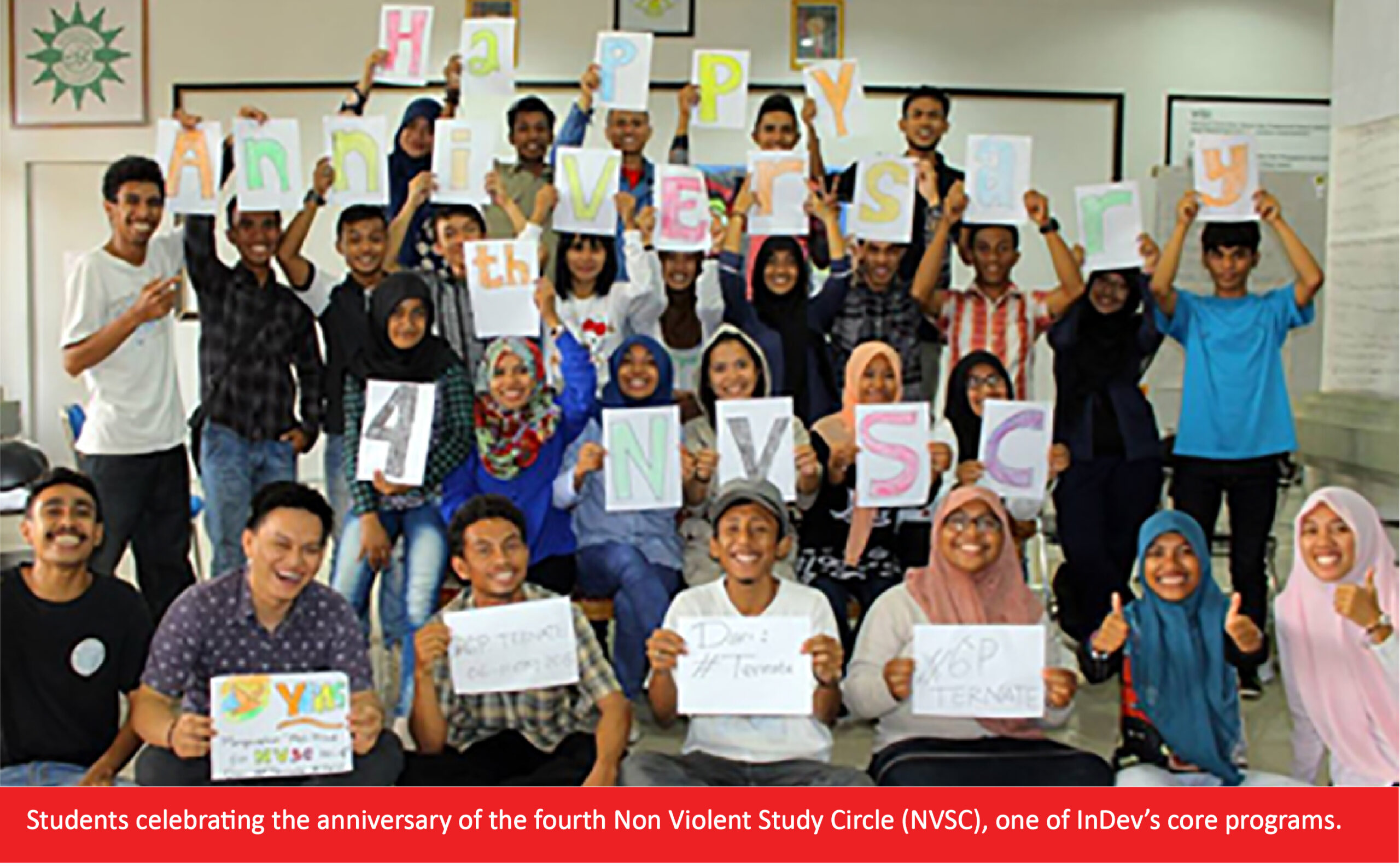
Following my Fellowship, I moved with my husband (a fellow IFP alumnus!) to West Papua in Eastern Indonesia, where I saw new types of injustice. Many communities there only have access to primary school, and there is a shortage of teachers, with sometimes only one teacher for 1st through 6th grade. Students have to travel outside their communities to pursue additional education. Following the 2004 tsunami, a lot of aid was directed to Indonesia, including opportunities and scholarships for students, but not as much was sent to the eastern part of the country. So I’m trying to support students in that area.
I also worked on a EP-Nuffic funded project in the region to improve the quality of education, research, and community services for engineering programs at four universities. We provided indirect support to fisheries and agriculture programs as well, which involved 9 universities in Eastern Indonesia in total. During the project, I was stationed in Ambon, Maluku, and I observed how segregation between Muslims and Christians in society affected political dynamics on campus and how this division is sharpened during local and national elections. This experience was the inspiration for me to initiate the Non Violent Study Circles (NVSC) program run by my NGO.
I launched the NGO, Inspiring Development (InDev) in August 2011, with my husband, Muhammad G. Korebima, and another IFP Fellow, Lusia Peilow, in response to violent conflicts involving students at Pattimura University. Our mission is “Sustaining Peace from Campus to Community,” considering the historical context of Maluku, which had a civil war between Muslim and Christian communities from 1999 to 2002.
In creating the program I also drew from my internship experience at the Montgomery County Public Schools (MCPS) Study Circles Program in Maryland. Through an emphasis dialogue and critical reflection, the program explores topics such as peace and nonviolence values, social identity, stereotypes, forms of oppression, and conflict management. The target participants are students who demonstrate leadership potential and represent different religions, ethnicities, genders, and academic disciplines. We look at what it means to be human and how to solve and transform conflict without violence. We are trying to foster the values and spirit of volunteerism.
We have received support from the United Nations Alliance of Civilizations (UNAOC), the Ford Foundation, World Learning, and Lisle International. And thanks also to Pattimura University and colleagues, we have been able to sustain and expand NVSC’s mission to seven other provinces to serve by students representing 33 universities. I have also drawn a lot of support from the Indonesia IFP alumni association, also known as the Indonesia Social Justice Network (ISJN).
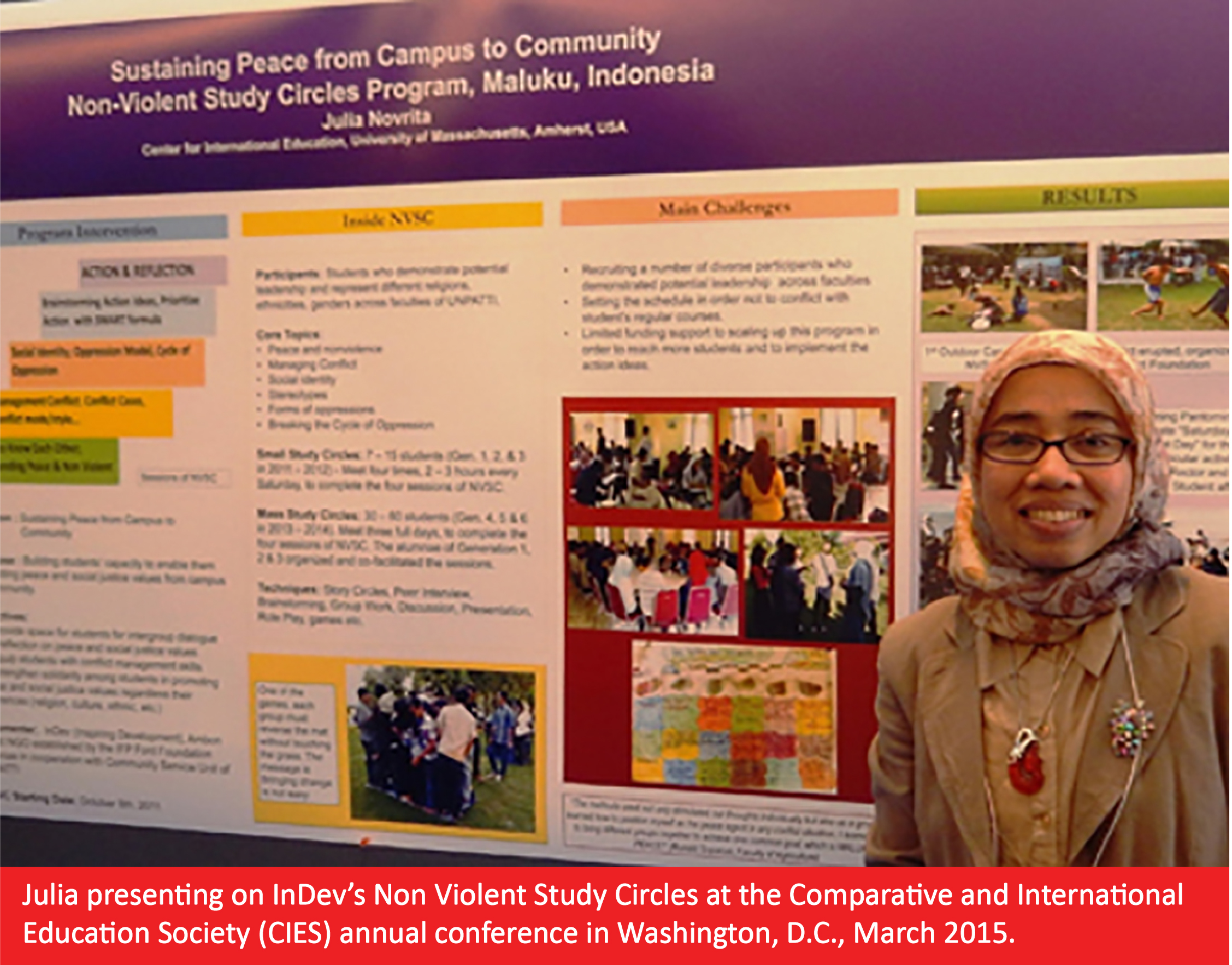
Reflections and Accomplishments
I’m really concerned with program impacts. The students are amazing. One received a global young emerging leader award and attended leadership training in Washington D.C. I try to help them take ownership of the program and hope they will create social change with the trainings and values they receive. I feel that my IFP fellowship increased my ability to design trainings that are effective. Now, I am focused on strengthening capacity of the program alumni to trainers and facilitators, as well as improving the quality of the program.
There are a lot of challenges and competing interests in the field of higher education in post-conflict settings, and I want to learn how to best approach these challenges through policy development. I see a window of opportunity in Indonesia right now. There is no official policy for post-conflict education, but there is support for it at the national level. There is more flexibility to design post-conflict education programs that are relevant to particular regional contexts, and I want to increase my capacity to contribute to development. My doctoral research is focused on student engagement. I see students as the agents of social change, and I want to be able to empower them to contribute to social reconciliation in Indonesia.
IFP Fellow 2010–2013 | Master’s in Film Studies, Howard University
Background and Motivation
When applying for IFP, I was an artist working in museums, with a strong interest in the role of arts and culture in improving the human condition, particularly in my region. I completed my undergraduate degree in fine arts from the Durban Institute of Technology. However, I felt a need to expand my networks and my understanding of how artists can contribute to social development.
I applied for the Ford Foundation International Fellowships Program to explore ways to enhance my work through learning, establishing new networks, and accessing platforms to support my mission of advancing social and cultural impact. I had hoped that IFP would allow me to connect with like-minded professionals and access platforms that align with my goal of using art to improve lives and communities.
IFP Experience: Professional and Personal Impact
IFP experience significantly boosted my confidence and ability to be a solutions-driven leader. It broadened my perspective on the global human conditions, extending beyond my immediate surroundings.
The program also honed my leadership skills, paving the way for my current position as CEO of the Javett Art Centre at the University of Pretoria, a major transdisciplinary university art center in South Africa. This role allows me to play a more influential role in collective efforts for social transformation and improving the quality of life for our communities.
IFP instilled a greater sense of confidence and the importance of collaboration in me.
It also equipped me with the skills to connect with diverse communities and work together to develop solutions. I have actively contributed to the arts community, mainly through involvement with local and international storytelling platforms and curatorial committees, such as the New York Times portfolio reviews.
Reflections and Accomplishments
Through exposure and skills I gained from IFP Fellowship, I have grown more confident and now fully appreciate the importance of collective action in accessing communities and collaborating to develop solutions.
My professional accomplishments include serving as the CEO of the Javett Art Centre and Head of the Market Photo Workshop. I am a founding and active member of Centres of Learning for Photography in Africa. I am also a member of the International Advisory Committee of CatchLight in San Francisco and served on the Curatorial Advisory Committee for Bamako Encounters in 2017.
Over the past five years, I have served numerous juries for prestigious photography and art awards. In 2020, I was honored to be the first African in over 60 years to chair the World Press Photo Awards General Jury.
One of my most meaningful memories of making art is winning a commission to design and build a bronze sculpture for President Nelson Mandela in 1999 when he was conferred with the Freedom of the City of Durban award. Through my production company, KGETHI IMAGES, I have produced over 200 interviews with former South African political prisoners.
My professional focus is to lead and advocate for the arts as essential to driving development agendas across Africa. I believe that arts and culture are powerful tools for social change, and I work to integrate them into broader conversations about progress.
Background and Motivation
Liezel Longboan was raised in the Kankanaey indigenous community in Bauko, Philippines and in Manila, Philippines. She received a Ford IFP Fellowship to complete her MA in Media and Communication at Cardiff University in the United Kingdom. Currently Liezel is a postdoctoral research assistant at the University of London, where she conducts research on the ability of communication technology to empower populations affected by natural disasters.
We spoke with Liezel about her background, social justice, and using technology to help those affected by natural disasters in the Philippines. This conversation has been edited and condensed for clarity.
I was born in Bauko, Philippines. I come from the Kankanaey indigenous group. When I was four years old, my parents moved my siblings and I to Manila for better educational opportunities. In Manila, I faced some challenges in school due to my indigenous background. There is a stigma towards the Kankanaey because they did not adopt the Spanish culture as much as other Filipinos. People think that we are wild and uneducated because we are from the mountains. In school, sometimes my classmates would make demeaning comments about me, even at the university level. I think there’s a lot of prejudice against indigenous people in the Philippines.
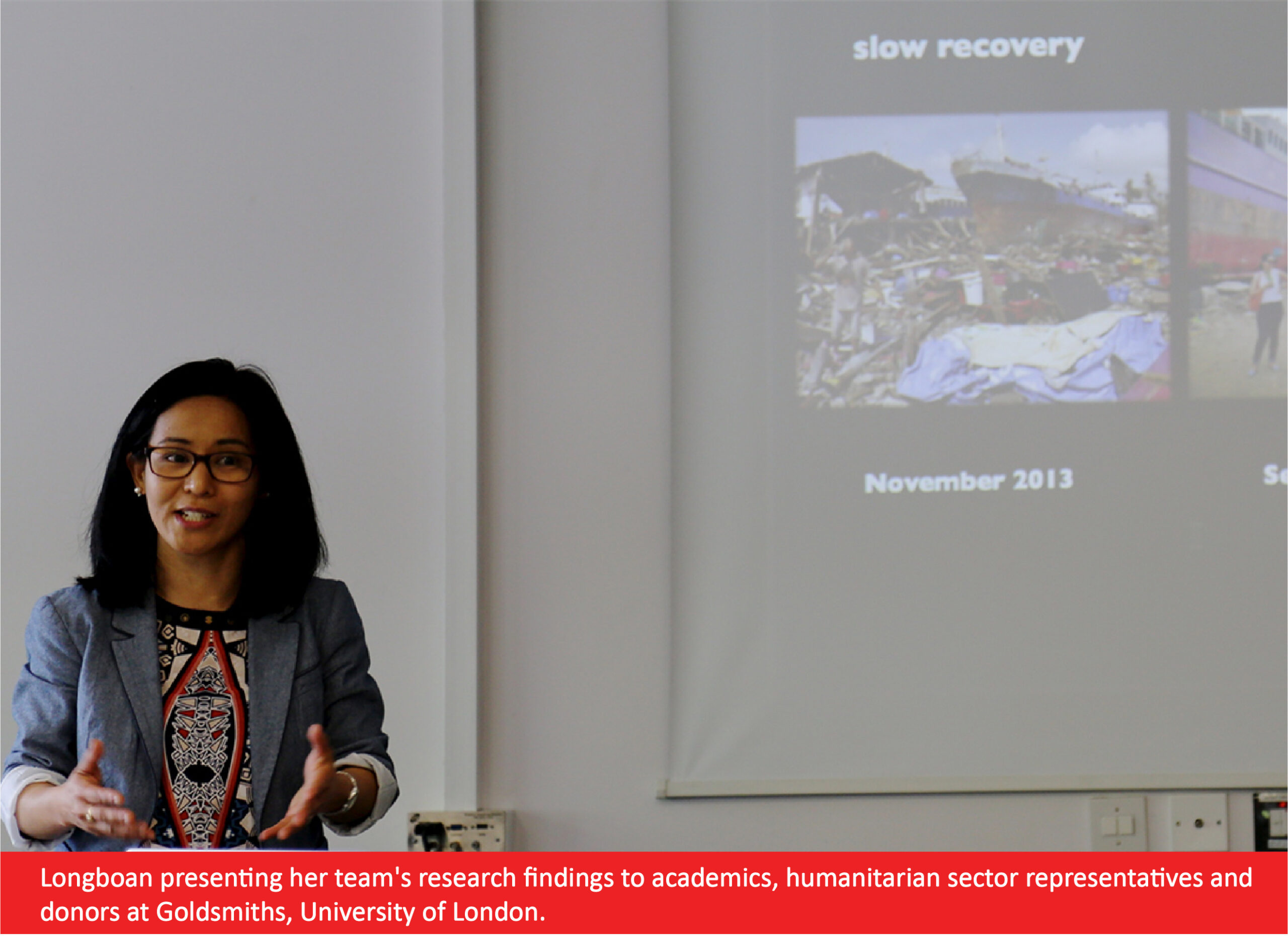
IFP Experience: Professional and Personal Impact
I found my calling in the field of academia. After graduating university, I was working as a professor in the communications department at the University of Philippines as well as a freelance journalist for a women’s rights NGO. A friend and former IFP Fellow recommended the fellowship to me. I thought it would be a chance to expand my career opportunities in academia.
I applied for a Master of Philosophy (MPhil) at Cardiff University. At the end of my first year, I consulted with my supervisor and I asked her if it would be possible to pursue a PhD. She encouraged me to go for it. So, through the support of IFP funding for the first two years and self-support for the last year, I was able to earn a PhD in media and communication.
I’m working as a postdoctoral researcher for the ‘Humanitarian Technologies Project: Communications in the Wake of Typhoon Haiyan’, based at the University of London. At the moment, I’m conducting field research for the project in Baclaran, Philippines. We’re looking at how the affected population here in Baclaran are using communications technologies like mobile phones in the recovery phase following the typhoon.
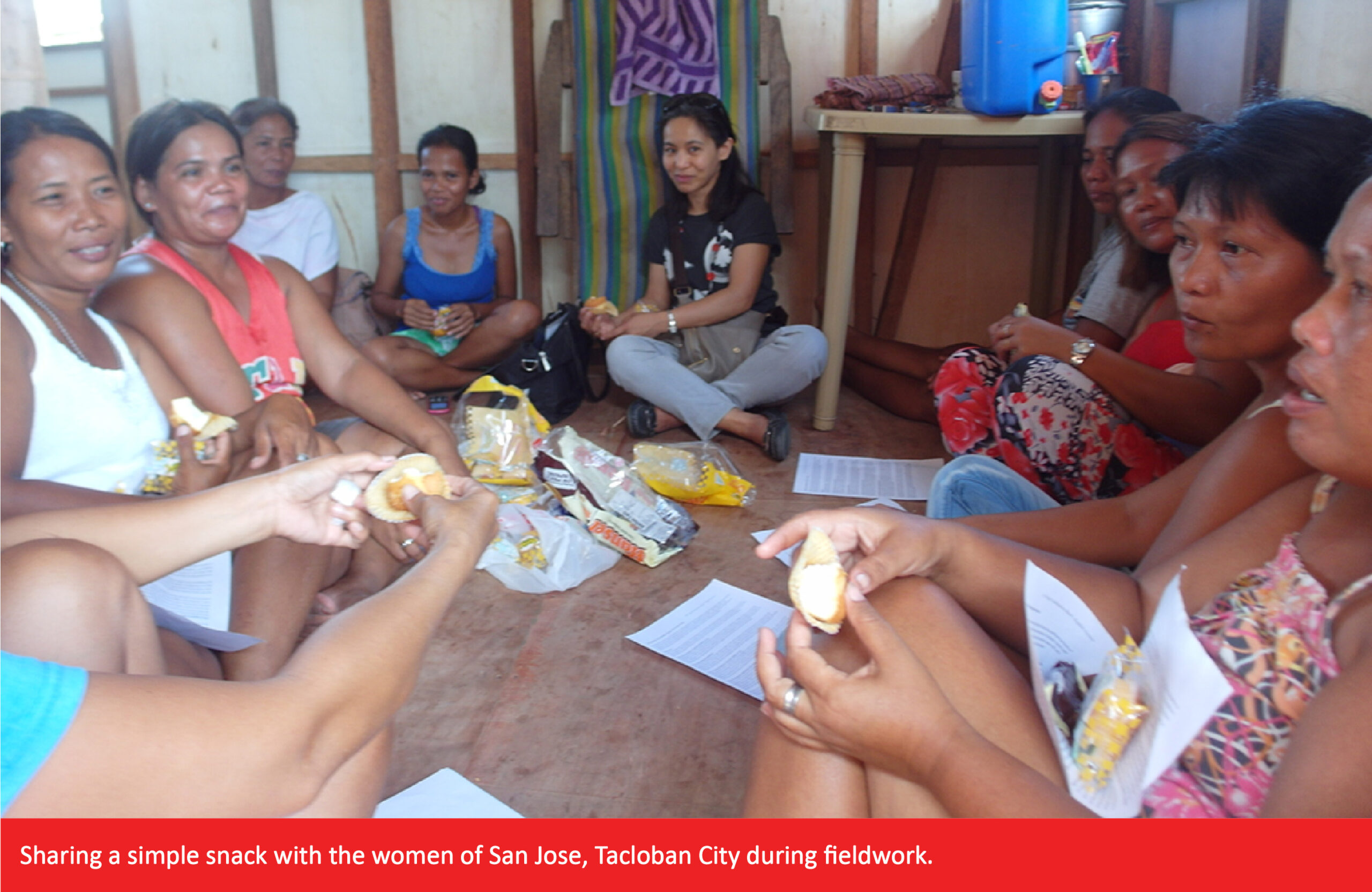
Reflections and Accomplishments
I learned research skills and different research methods as well as how to organize data and conduct interviews. I’m using these skills now in my work in Baclaran.
I think the most important thing about this research and how it’s related to my fellowship is the social justice aspect. Our research is about voice. We’ve seen a lot of research related to disasters, but not many studies have examined how affected people express their concerns or sentiments about the way aid is provided to them or in the way the government assists them during the recovery process. I think our study is one of very few which looks at how people engage with the government and humanitarians about the delivery of aid.
I think the fellowship from IFP has definitely impacted all aspects of my life, personally and professionally. Now I’m in a position where I can contribute to policymaking and improving communications in a disaster environment. It’s wonderful – I have a job and I’m enjoying it. I feel empowered. At the same time, I’m in a position where I can also influence my family even if I’m not in the Philippines.
In 2024, Liezel provided additional context in a separate survey.
Background and Motivation
When I applied for IFP in 2005, I taught media and communication courses at the University of the Philippines in Baguio as a freelance journalist. I had just discovered blogging and was part of a growing community of indigenous bloggers from the Cordillera region where I was based. I was also part of a lively online community called Bibaknets, where a small group of Igorots from across the world shared stories and discussed politics, culture, and other burning topics of the day. Through the collective efforts of Bibaknets and online communities, I contributed to removing a culturally insensitive statue of an Igorot in Baguio City.
It was a crucial time in the growth of online communities among indigenous Igorots. As an active member of the Igorot online community and as a fledgling academic, I realized that very few Igorot researchers were looking at new media technologies and how indigenous Filipinos were engaging with them. I recognized the need to bring new media technologies to the broader community and applied for IFP to study abroad. It offered me the chance to connect with like-minded individuals from around the world and explore fresh perspectives.
IFP Experience: Professional and Personal Impact
My IFP experience has allowed me to examine my indigenous roots in new ways. It has also allowed me to highlight the stories of migrant and technology-savvy Indigenous Igorots, thereby contributing to the creation of knowledge about ourselves.
I received IFP Fellowship to pursue a master’s degree, and after that decided to pursue a doctoral degree that I supported myself. Obtaining a Ph.D. in the United Kingdom has given me the confidence to engage in debates and shape discussions around Indigenous people, migrant Filipinos, and new technology.
Education in the United Kingdom has changed my life drastically. I went from being a rather reserved person in the Philippines to learning how to speak up, assert myself, and be more intentional in my actions. As an international student, I met people from all walks of life from across the world, which helped me understand the ideas around race, diversity, and inclusion, which have now become the focus of my work. Through my IFP experience, I have pursued a career encompassing academic research and engagement in the nonprofit sector.
Reflections and Accomplishments
In 2020, during the peak of the COVID-19 pandemic, I founded Tinig UK, a nonprofit community media platform for Filipinos living in the United Kingdom. I launched the Tinig UK website to focus on the pandemic’s impact on the Filipino community and provide them with reliable information.
The UK mainstream media and existing UK-based Philippine media had little coverage of the disproportionate deaths among Filipino healthcare workers at the onset of the pandemic in 2020. At least 80 Filipino healthcare staff died of COVID-19, the highest among all ethnicities in the sector. I was the first Filipino journalist to raise my voice for the inclusion of the Filipino ethnic category in the National Health Service (NHS) staff electronic records because of the lack of data on Filipino nurses during the pandemic. Following Tinig UK’s announcement, UK health and nursing media sites followed suit.
I wrote original articles examining Filipino nurses’ statistics across the UK and the challenge of getting reliable data about their ethnicity/nationality during the COVID-19 pandemic. My media reports contributed significantly to the efforts of Filipino nurses in advocating for establishing a distinct Filipino ethnic category in NHS records. We achieved this historic milestone in January 2022. NHS now provides Filipino staff members a separate ethnic category, allowing them to self-identify as ‘Filipino’ in their electronic staff record (ESR).
Since founding Tinig UK we continue to experience gradual but steady growth. We have been praised for helping change the representation of Filipino women in the United Kingdom. As a community website, we feature Filipino women from diverse backgrounds and professions, celebrating their skills and contributions to the United Kingdom. My research has revealed that Filipinos in the UK require guidance on various topics as they navigate their lives as immigrants in the UK, and Tinig UK aims to fill this gap. Our efforts have earned accolades from Filipino nursing leaders, academics, and community leaders. As part of my advocacy work, I plan to influence policy in the coming years.
IFP Fellow 2008–2010 | Master’s in Water Engineering & Environment, Birzeit University
Background and Motivation
After completing my undergraduate degree in Civil Engineering, I was eager to pursue higher education to specialize in environmental issues. When I came across the announcement of IFP Fellowship accidentally, it seemed like the perfect opportunity to pursue environmental issues. The scholarship offered comprehensive support, not only covering the tuition fees but also providing valuable coursework designed to equip us with the knowledge and skills needed to become influential leaders and serve our communities.
IFP Experience: Professional and Personal Impact
My studies in engineering and environment, coupled with my involvement in high-level discussions on policy-making and regulatory laws, have contributed to positive changes in environmental practices in my community. I have been able to influence behaviors and address harmful practices, particularly in environmental protection and preservation.
IFP’s focus on addressing complex challenges aligned perfectly with my aspirations. I’ve been able to influence discussions on construction issues, promote green and circular economies, and support the professional development of numerous graduates through my role as the Director of Training and Employment at the Palestinian Engineers Association and facilitator for the Palestinian Supreme Council for Green Buildings.
IFP has been instrumental in shaping my professional journey, providing me with the opportunity to develop and implement innovative solutions to pressing environmental challenges. This experience has allowed me to emerge as a prominent influencer in the field of construction.
Reflections and Accomplishments
IFP significantly enhanced my ability to present environmental initiatives and develop impactful project proposals. These have been instrumental in my professional and volunteer work, as I’ve successfully implemented numerous initiatives and written proposals that benefit the local community while prioritizing sustainability. I aim to ensure that future generations have the right to a healthy environment.
I am proud to be a recognized expert in green buildings and currently lead the Engineers Training and Leadership Center at the Palestinian Engineers Syndicate. As a researcher and consultant, I actively contribute to the field of environmental issues. Additionally, I serve as president of the IFP Alumni Association and a board member of the Palestinian Trainers Association.
IFP Experience: Professional and Personal Impact
Margarita Lavides emerged as an international expert in marine conservation as a result of her IFP experience. In 2010, Margarita earned an award for Outstanding Scholarly Work for Science and Engineering for her doctoral research in marine science at the University of Newcastle and published a prize-winning article on finish conservation in Bohol, Philippines in the Cambridge Journal of Environmental Conservation.
“IFP provided me with the skills and knowledge — and more importantly, the network — that led to a globally competitive science-based conservation practice. I am able to translate science into a practice that benefits the poor fisher communities I serve.”
Because of the education she received through IFP, Margarita claims she “gained an added profile that earned [her] the credibility and trust of people and organizations at both [the] national and global level.” When asked why she decided to leverage this profile as an international marine conservation expert to advance causes back in the Philippines, Margarita explained, “It’s like a child who thought that she found the best lesson ever from her schoolteacher and was excited to share with her parents and siblings back home.”
However, marine conservation policies, particularly in the Philippines, are dependent on the researcher’s ability to secure adequate funding. For example, Margarita and her former PhD supervisor, Nick Polunin, codirected a Darwin Initiative Project to understand the relationship between fishing patterns and local reef fish extinction in the Philippines. To sustain the program, Margarita and Prof. Polunin were able secure a $450,000 grant from the British government. Because of the funding, the project produced research that was included in the National Action Plan to Prevent Species Extinction and informed local legislation protecting certain fish from extinction. Leveraging her international credibility as a marine conservationist, Margarita was able to raise an additional $1 million for the project through the United Nations Development Program – Global Environment Facility. The continued project led to more fish being caught, better compliance of fishery regulations, and increased income for local fishermen.
IFP Fellow 2002–2005 | Master’s in Social Work, Columbia University
Background and Motivation
My eight years with Nordic Assistance in Vietnam were a deeply impactful experience. Working with mountainous minority ethnic women, I witnessed the devastating effects of poverty, not just financially but also emotionally and psychologically. While income-generating projects were essential, I realized the need for social support and mental health resources. The women shared their anxieties, fears, and trauma, emphasizing the need for a holistic approach to their well-being. This ignited my passion to pursue higher education in social work and mental health counseling.
Ford Foundation International Fellowships Program was the perfect opportunity to develop the skills I needed to support the women I worked with more comprehensively. I envisioned gaining a solid foundation in social work principles and mental health counseling techniques, enabling me to address their emotional needs, connect them with appropriate resources, and advocate for these women. IFP’s focus on social development resonated deeply with my evolving goals, and I was excited to join a community dedicated to social change.
IFP Experience: Professional and Personal Impact
IFP Fellowship was a pivotal experience that significantly shaped my professional and personal journey. While my experience in English teaching and work with Nordic Assistance laid a solid foundation, IFP Fellowship catalyzed my passion for social work and mental health. It highlighted the critical role these fields play in addressing the needs of under-resourced communities in Vietnam. The fellowship equipped me with the necessary skills and knowledge to become a professional social worker. It allowed me to expand my research toolkit and develop evidence-based practices, empowering me to advocate for my clients with greater conviction.
Moreover, my bilingual skills in Vietnamese and English were significantly enhanced through the English language training provided by IFP. This fluency enables me to bridge communication gaps and deliver culturally competent services, fostering trust and understanding with clients and international partners.
Beyond its professional impact, the fellowship profoundly influenced my personal life. The knowledge gained about mental health allowed me to address the lingering trauma from the Vietnam War, fostering a sense of healing and resilience. This newfound understanding also enabled me to provide effective support to others, including clients, friends, and the communities I serve
IFP was instrumental in my transition from a teacher to a bilingual social worker, equipping me with a mixed-method approach. It empowers me to not only advocate for my clients but also to contribute to the development of data-driven social policies.
Reflections and Accomplishments
IFP Fellowship equipped me to make a real difference. Working as a social worker in New York City, I focused on the Vietnamese American community. My bilingual skills and understanding of their cultural nuances, honed during IFP, proved invaluable. I became an advocate for Vietnamese women facing domestic violence and those struggling with mental health due to language barriers.
These experiences fueled my desire to further my impact. Drawing on my IFP experience, I pursued doctoral research, focusing on Vietnamese women in New York and those back in Vietnam. My research delves into the root causes of mental health disparities, not just in Vietnam and under-resourced communities in the U.S. but also in other developing countries.
IFP Fellowship has empowered me to transition from a community worker to a social and behavioral scientist. Presently, I stand proud to be a mental health expert, well-versed in social determinants of health. My research delves into the root causes of mental health disparities, not just in Vietnam and under-resourced communities in the United States but also in low- and middle-income countries.
IFP Fellow 2004–2006 | Master’s in International Development, Brandeis University
Background and Motivation
I was fortunate to be selected for the Ford Foundation International Fellowships Program in 2003 after applying twice. The growing impact of globalization and democratization on Tanzania’s economy and the East African region motivated me to pursue a career in development. My primary goal in applying for IFP was to deepen my understanding of sustainable development theories and practices, with a particular focus on policy, micro-enterprise development, and microfinancing. I recognized the critical role these areas play in addressing economic, political, and social development challenges at both national and grassroots levels. I believed that higher education through IFP would equip me to address my region’s developmental constraints.
My Back Home Action Plan (BHAP) outlined two primary objectives. First, I aimed to work with international development organizations in East Africa, focusing on microfinance institutions and poverty alleviation. Second, I considered the possibility of working for a national organization and developing a grassroots microfinance network.
IFP Experience: Professional and Personal Impact
IFP fellowship had a profound impact on both my personal and professional life. It empowered me and my family, inspiring my wife to continue her undergraduate studies, and she is currently close to completing her Ph.D. in nursing and midwifery.
Furthermore, the cultural experiences I gained during the fellowship were invaluable. Workshops, visits, tours, conferences, and travels gave me valuable insights into diverse cultures and people, and I developed a strong understanding of how to conduct myself in cross-cultural situations.
IFP was transformative—it boosted my professional trajectory, leading to a position as an assistant lecturer at Moshi University College of Co-op and Business Studies. IFP experience gave me the foundation to enter academia confidently. Over the years, I have contributed to the development of my institution; it has transformed from a college to a university.
I plan to pursue a Ph.D. to strengthen my academic profile and prepare for a consulting career with local and international organizations. This next step is crucial to advancing both my academic and IFP goals.
Reflections and Accomplishments
The knowledge and skills I acquired through IFP have been instrumental in my teaching career. My first academic publication, completed during my master’s degree, laid the foundation for future research and publications. IFP has played a crucial role in establishing my professional stability. It led me to secure a position with a large local microfinance NGO and later work as faculty at Moshi Co-operative University.
I am thrilled that IFP alumni in Tanzania have collaborated to establish the Tanzania International Fellowship Program Alumni Association (TIFPA). This organization connects 104 IFP alumni across the country and operates under a formal constitution, with leadership based in Dar es Salaam. The network allows us to share experiences and resources that enhance our efforts in driving social change and educational improvement in our communities.
My primary goal has been utilizing microfinance tools to alleviate poverty and promote social justice by expanding people’s economic opportunities. However, the industry has undergone significant shifts, with financial inclusion policies increasingly relying on digital technologies to replace traditional microfinance services. This has presented a challenge for my proposed microfinance intervention model in achieving its goal of building economic vitality within local communities.
Thus, my learning continues. One of my proudest accomplishments is my enrollment in a data science training program. This new endeavor aligns with my expertise and the evolving landscape of the field. Through this program, I have acquired valuable coding skills and a deeper understanding of the rapid pace of technological advancements.
IFP Fellow 2004–2006 | Master’s in Educational Reform, Université Laval
Background and Motivation
I was a high school teacher from 1988 to 2001; after that, I was the coordinator of the Division of the middle schools and the high schools at the Ministry of Education.
So, I needed to improve my skills in education administration and educational reform.
I began my career as a high school teacher in 1988 and later served as the coordinator of the Division of Middle and High Schools at the Ministry of Education. I pursued higher education through the Ford Foundation International Fellowships Program to enhance my educational administration and reform skills.
IFP Experience: Professional and Personal Impact
IFP Fellowship significantly impacted my career and personal life. I became more involved in community activities, experienced increased salary and social recognition, and gained greater professional respect. IFP experience and higher education from Université Laval provided me with academic skills and international exposure that enabled me to successfully take on leadership roles in the Ministry of Education in Senegal.
Since completing the fellowship, I have held various positions within the Ministry of Education, including Coordinator of the Division of Middle and High Schools and Coordinator of the ADEM/Dakar project, a program funded by the Agence Française de Développement. This project focused on modernizing schools and training teachers in science. My involvement in this project allowed me to work closely with different ministerial divisions, influencing policy decisions.
Reflections and Accomplishments
While officially retired, I continue to contribute to the field of education as a resource person for workshops and studies. I am also involved in various associations focused on project management, inclusive education, and girls’ and women’s protection and empowerment.
I am proud to have led a program that contributed to advancing education for marginalized populations in Dakar. Through my efforts, over 20,000 students have benefited from the construction of modern schools. My work has earned me the respect of Senegalese authorities, and I am frequently sought after by politicians and civil organizations for my expertise. My IFP experience and leadership in education, combined with my public administration and policy evaluation skills, have played a key role in my work as a policy influencer.
IFP has profoundly impacted my life, and I am committed to continuing my service to the African community throughout my lifetime.
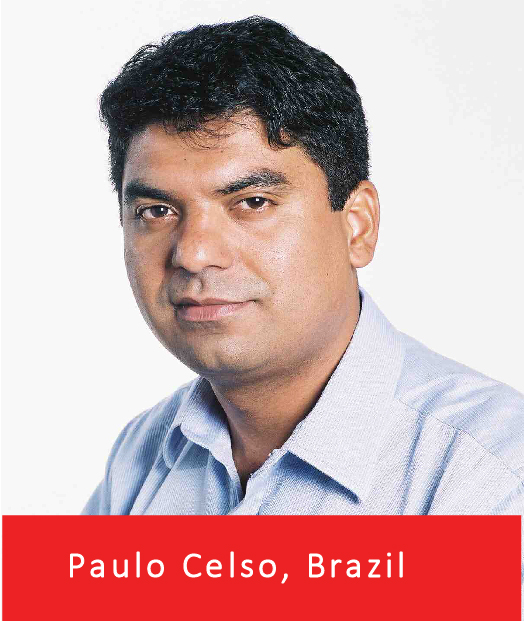
IFP Fellow 2004-2006 | Master’s in Law, Pontificia Universidade Catolica do Parana (PUCPR), Brazil
Background and Motivation
Paulo Celso de Oliveira comes from the Pankararu indigenous people in Pernambuco, northeastern Brazil . During his childhood, Paulo’s family lived in São Paulo and then returned to the Pankararu Indigenous Land. The contrast between Paulo’s education in São Paulo—where he had access to school—and the six-mile walk to school in Tacaratu-PE, near the Pankararu Indigenous Land, left a lasting impression. He found that public policies should assist indigenous people living away from urban centers.
IFP Experience: Professional and Personal Impact
Paulo was encouraged to pursue law while participating in the mobilizations of the Indigenous Nations Union (UNI) for recognition of indigenous people’s rights, where the approval of the 1988 Brazilian Constitution was discussed. In 1994, he became the first indigenous lawyer in Brazil and since then has been acting in defense of the indigenous people’s territorial and cultural rights in different regions of Brazil. Paulo applied to IFP to deepen his knowledge in social and economic law. “My friends and family always told me that I could not forget my heritage, my culture and the indigenous people. This is important to keeping a commitment after having graduated, to use the knowledge in favor of our communities. By achieving my Master’s degree with IFP’s support, I had the opportunity to empower my intellectual autonomy and consolidate my career in defense of indigenous rights.”
In 2010, Paulo served as Ombudsman of the National Indian Foundation—FUNAI, collaborating for the dialogue between indigenous people and the government. In 2015, Paulo co-founded one of the first human rights law offices in Brazil. “One of the issues that have kept injustices against indigenous people is the lack of educational and professional opportunities. That is why IFP has a strong meaning for me. It is important from a personal perspective and as an example of a program for indigenous professionals who will collaborate for the autonomy and advocacy of indigenous people in issues related to their rights and interests.
IFP Fellow 2008–2010 | Master’s in International Development and Social Changes, Clark University
Background and Motivation
Hailing from a rural background in the northeastern region of Thailand, my family’s agrarian roots presented significant financial challenges in pursuing higher education. Despite these obstacles, my parents were determined to ensure that my brother and I had the opportunity to attend college. To support our education and family expenses, my father worked as a migrant worker in the Middle East and Japan. Although the journey was arduous, my commitment to education remained steadfast, echoing the aspirations of my parents.
After earning a Bachelor of Arts degree from Ramkhamhaeng University, I pursued a career aligned with my advocacy interests, working with local NGOs in my hometown. My efforts primarily focused on initiatives related to children, women, and education, most notably, projects addressing the needs of women with HIV/AIDS. This professional journey was the foundation that led to my application to the Ford Foundation International Fellowships Program.
IFP Experience: Professional and Personal Impact
After completing my master’s degree through IFP and extensive experience in the NGO and development sectors, I have established my consulting firm. I am also pursuing a Ph.D. in Sociology and Anthropology at Chiang Mai University.
My experience with IFP and at Clark University has significantly impacted my life and career. Unlike other scholarship programs to study abroad, IFP offered English language training. This training made me proficient in English and greatly enhanced my professional and academic connections. This language proficiency has also led to increased income, allowing me to support my family better.
My network expanded through IFP which has also benefited the NGOs I work with, providing them access to a broader spectrum of opportunities they could not have previously accessed.
Reflections and Accomplishments
Multiculturalism is essential for addressing development issues. I drew on this adage while interacting with numerous international students from diverse continents. Cultivating respect for others is the key to harmonious living and effective engagement in human society. This fundamental lesson has profoundly influenced both my professional endeavors and personal life.
I have garnered valuable experience through my collaborations with international organizations. Exposure to diverse perspectives and experiences from various individuals has enriched my understanding. Subsequently, I successfully applied these insights to my activism and business endeavors.
Background and Motivation
Raphael Obonyo was raised in a low-income community in Korogocho in the city of Nairobi. Hailing from a low-income family, his parents and friends worked hard to get him the necessary education. Through the Ford Foundation International Fellowships Program (IFP) scholarship, he completed his Master’s in Public Policy at Duke University in 2013.
“I want to say that I am a proud alumnus of IFP. I consider it to be a transformtive journey where I discovered myself and opened my eyes to enormous opportunism around me. It helped me in advancing my responsibility towards my community for social justice, reflecting on how I benefited from my community in turn and led me to work on social justice issues wherever I am.“
Following his time abroad, Raphael has dedicated his energy and time to many initiatives to uplift the lives of the people in his community such as The Youth Congress, the Koch initiative, and Koch FM, Kenya’s first-ever community radio. In addition to being actively engaged in the community, he is also an advocate for social justice at a global level. He has served as Africa’s representative on the World Bank’s Board on Youth and Corruption, UN Habitat’s Youth Advisory Board, and UNESCO’s Youth Advisory Group. When we spoke to Raphael, he expressed his dream to become Kenya’s President, or the United Nations Secretary General in the future.
This conversation has been edited and condensed for clarity.
IFP Experience: Professional and Personal Impact
I was named as one of the top 100 influential leaders in Africa It has definitely been an exciting journey, but also humbling. I want to see this not as a mark of accomplishment, but more of a call to action where I need to perform better for myself and the continent, as a whole.
First of all, I want to emphasize that getting the scholarship was hard, and I was excited when I received it after the rigorous process of applications and interviews. I think, it was an overall experience for me, not just in terms of academics but in community development, it gave me a moment to reflect and understand the expectations of being in the field of social justice. So, it was a combination of academic progression and social justice work. But, I want to say that this is an extraordinary scholarship, where I got the opportunity to choose from the best institutions, and develop skills and knowledge to the best of my abilities. Being in a world class University, I was able to develop networks, and the skills were extremely useful in reviewing the National Youth policy in Kenya, in order to start a number of initiatives.
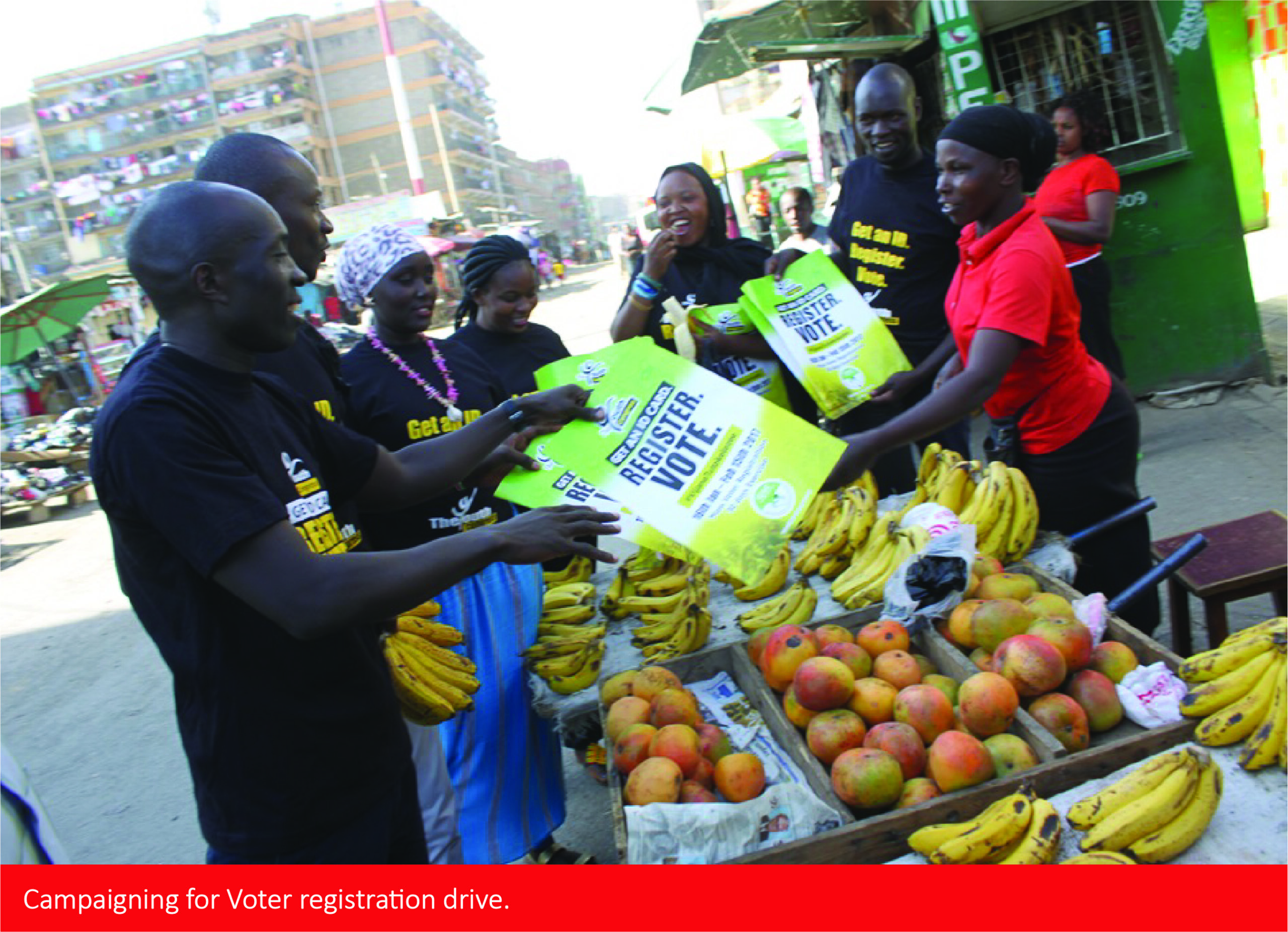
Whenever people spoke about Korogocho, the discussion was always in a negative manner, the amount of crime rate or the rate of poverty. But, for us, it was our home, so the question we asked ourselves was how could we change the narrative of Korogocho? We realized that many people were not involved in social justice or advocating for human rights. This is where the idea of community radio came into existence. It enabled more people to get involved on championing good governance and social justice issues. Koch FM was the first community radio in the country, many of them warned us against it. But, we actively engaged in the initiative as we wanted to change the narrative of our community.
With the Youth Congress, we are engaged in two main initiatives. The first one is about supporting livelihoods of young people in informal settlements. Many of the Youth in Kenya today, are pushed into informal settlements as they cannot find jobs, and due to increased urbanization, many of them find themselves in slums. There is a lack of economic empowerment in the talented youth, and we wanted to address that by providing necessary skills and capital to generate income, and it has delivered outstanding results for the youth who cannot fend for themselves. The second project involves the Young people to engage in decision making, as the Youth of today cannot be just silent listeners. We provide skills that involve training the Youth, provide leadership skills, engage with duty-bearers. The Youth must feel that they are not in the margins and we have also developed a number of on-going initiatives such as ‘Youth Aspirers Forum’, ‘Not too young to run’ in order to develop Youth with good values.
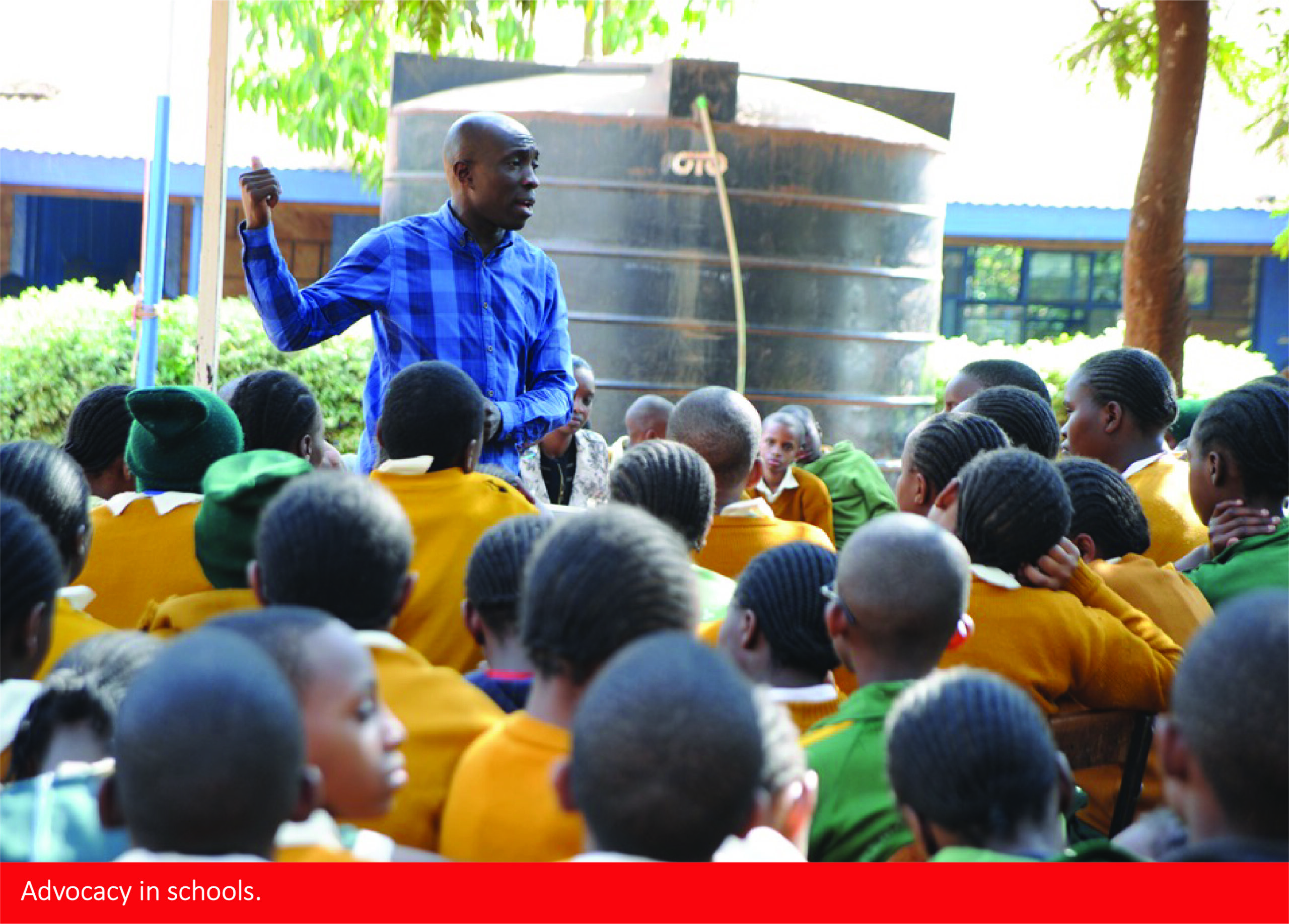
Since 2001, there were a lot of sexual violence cases in the neighborhood, and rape cases. This was destroying the reputation of the community further and we were facing a lot of issues. We had an idea about a beauty pageant, and how it could change the mindsets of the people in korogocho about women. The motto of the beauty pageant was ‘Mobilize community action’. We wanted to show that women can live a dignified life and also championing girls’ education. Through this initiative, people appreciated girls’ rights and girls’ education, we also helped to raise funds through which 1000 girls accessed secondary and college education. In addition to this, the Koch initiative has also helped in advocating for human rights, clean water and sanitation, and housing initiatives. Looking at the success of the Koch Initiative in Korogocho, other low-income areas in Nairobi such as Kibera and Kwangware have started their own community beauty pageant. The Koch initiative has also won many awards across the country and is recognized nationally.
Reflections and Accomplishments
I believe it is important in being rooted in community work because that is where I began my work, regardless of the spaces I find myself in. But, I also believe that I want to work to create global change. As I have a number of initiatives at the community level, it gives way to new ideas and the feedback that I receive from the community connects me to National and global platforms. I feel that policy is informed by practice and the community aspect of my work helps me connect to this.
We must find ways in higher education for social justice actors to come, jump in and promote social justice. This involves ensuring that education is available, accessible and affordable as a right and not as a privilege. Nelson Mandela said that “Education is the strongest tool to fight poverty”, But why are people in areas like Korogocho not able to access it? I do think creating more opportunities and spaces will improve relations between higher education and social justice.
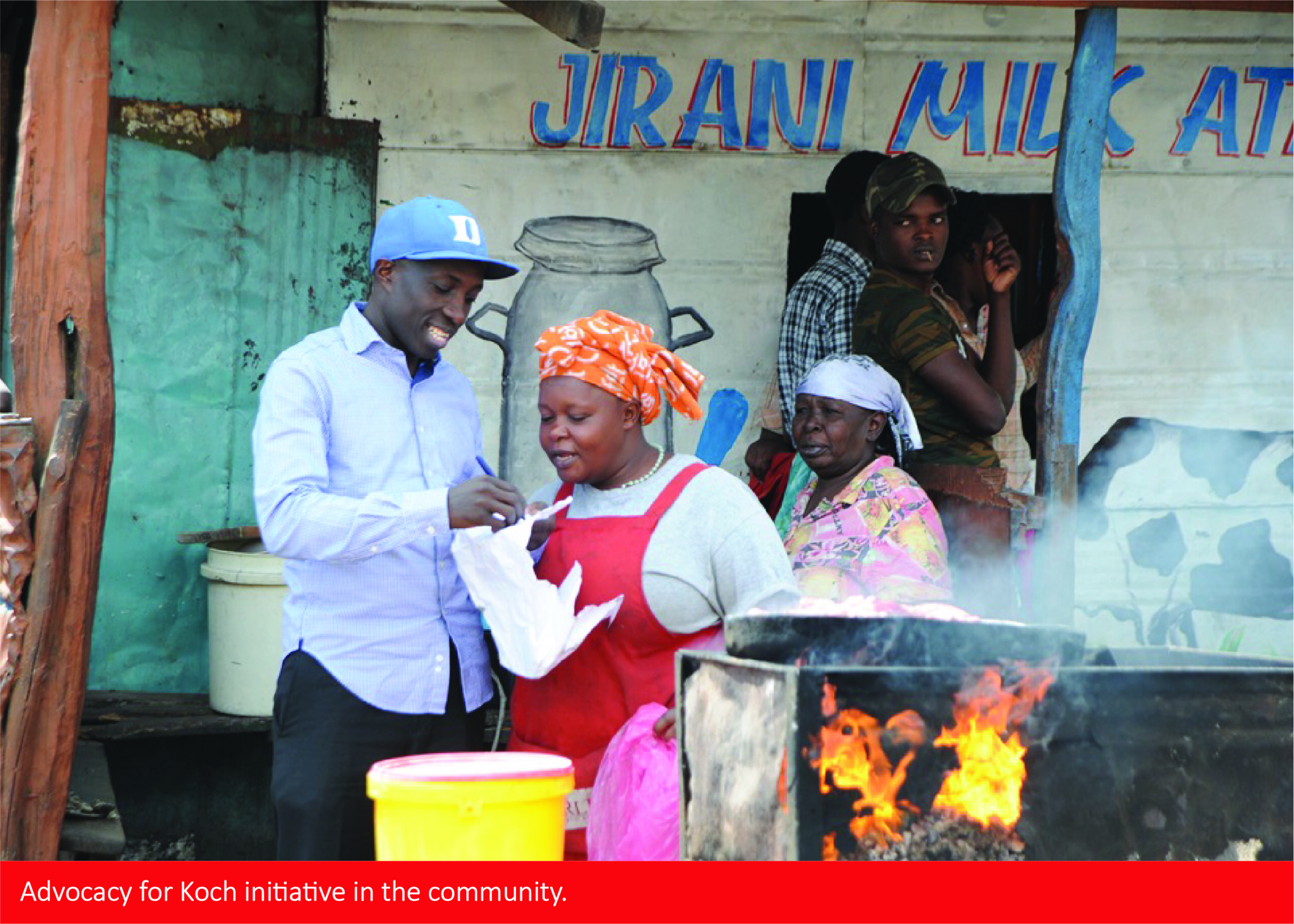
Background and Motivation
When Roderick was seven years old, his family was forcibly removed from their Cape Town home by the Apartheid government and relocated to the Bonteheuwel township, an area in the Cape Flats area of the city designated for “coloured” communities. Life in Bonteheuwel was challenging for him and other residents, and he experienced difficulties accessing quality education, even with constant encouragement from his family. Despite these challenges, Roderick became a successful artist, printmaker, and cartographer, and was the first in his family to complete higher education by obtaining Bachelor’s and Master’s degrees in Fine Arts at the University of Cape Town (UCT).
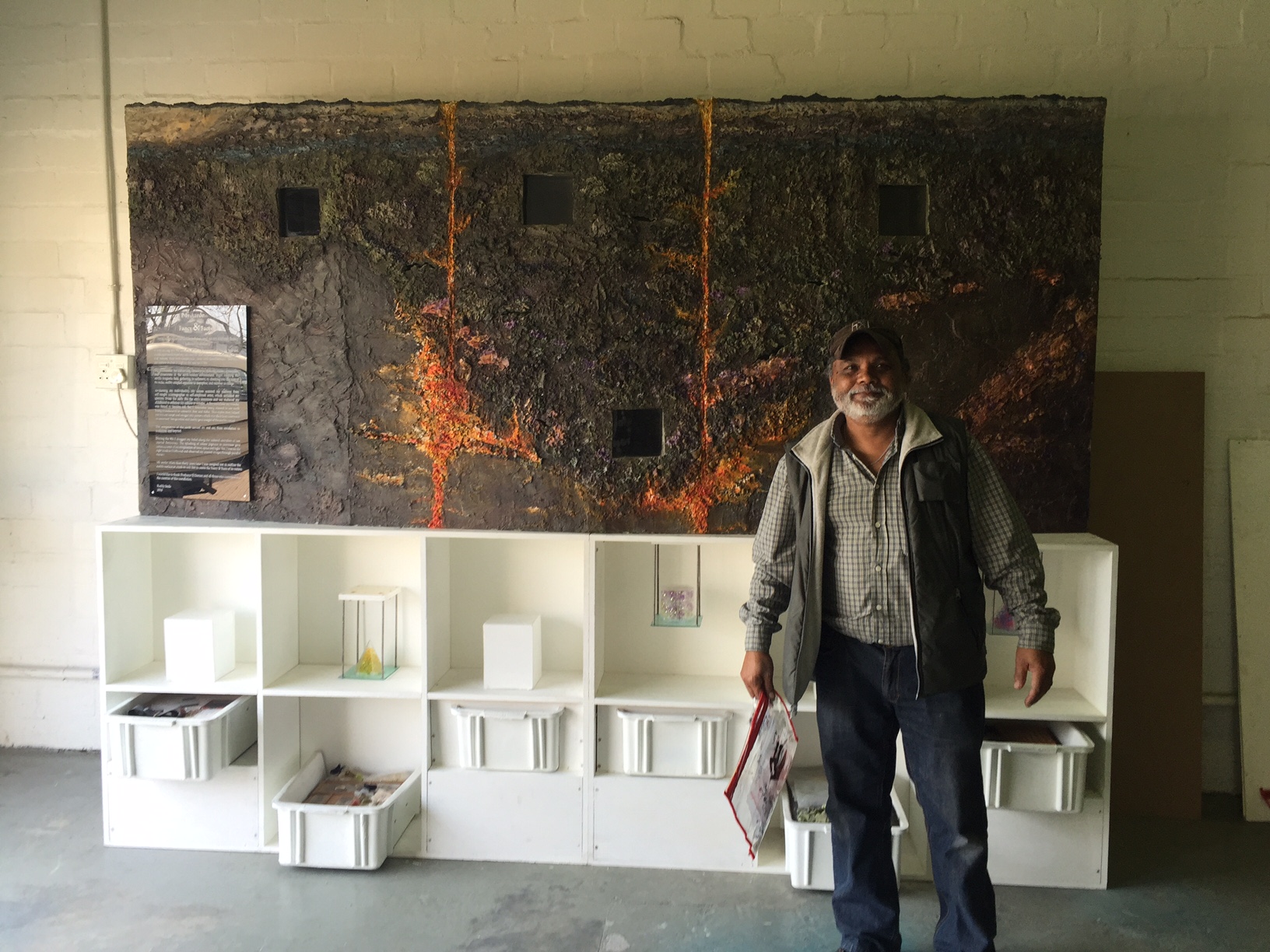
IFP Experience: Professional and Personal Impact
Before IFP, Roderick was a lecturer at UCT and co-founder of Arts@school, a nonprofit organization that works with museums and galleries to provide art classes to students in the Cape Flats. Despite difficulties finding a thesis adviser because no white faculty members would work with him, Roderick earned a Ph.D. in Sociology from the University of the Western Cape. Through his graduate work, he sought to understand “how creativity can enhance the culture of learning in schools, especially amongst the previously marginalized groups.” His Ph.D. research revealed that students participating in arts classes have increased self-esteem and life- and labor-related competencies.Although Roderick is as committed to promoting social justice as he was before IFP, he feels his IFP experience gave him more confidence, tools, and leadership skills. This in turn is helping him advance social change in Cape Flats and other marginalized communities through creativity programs that promote inclusive social and economic development. Since IFP, the results of the Arts@school program have been very positive in the Cape Flats communities. Roderick and his colleagues have seen improvements in student test scores, as well as greater interest and pride in school.
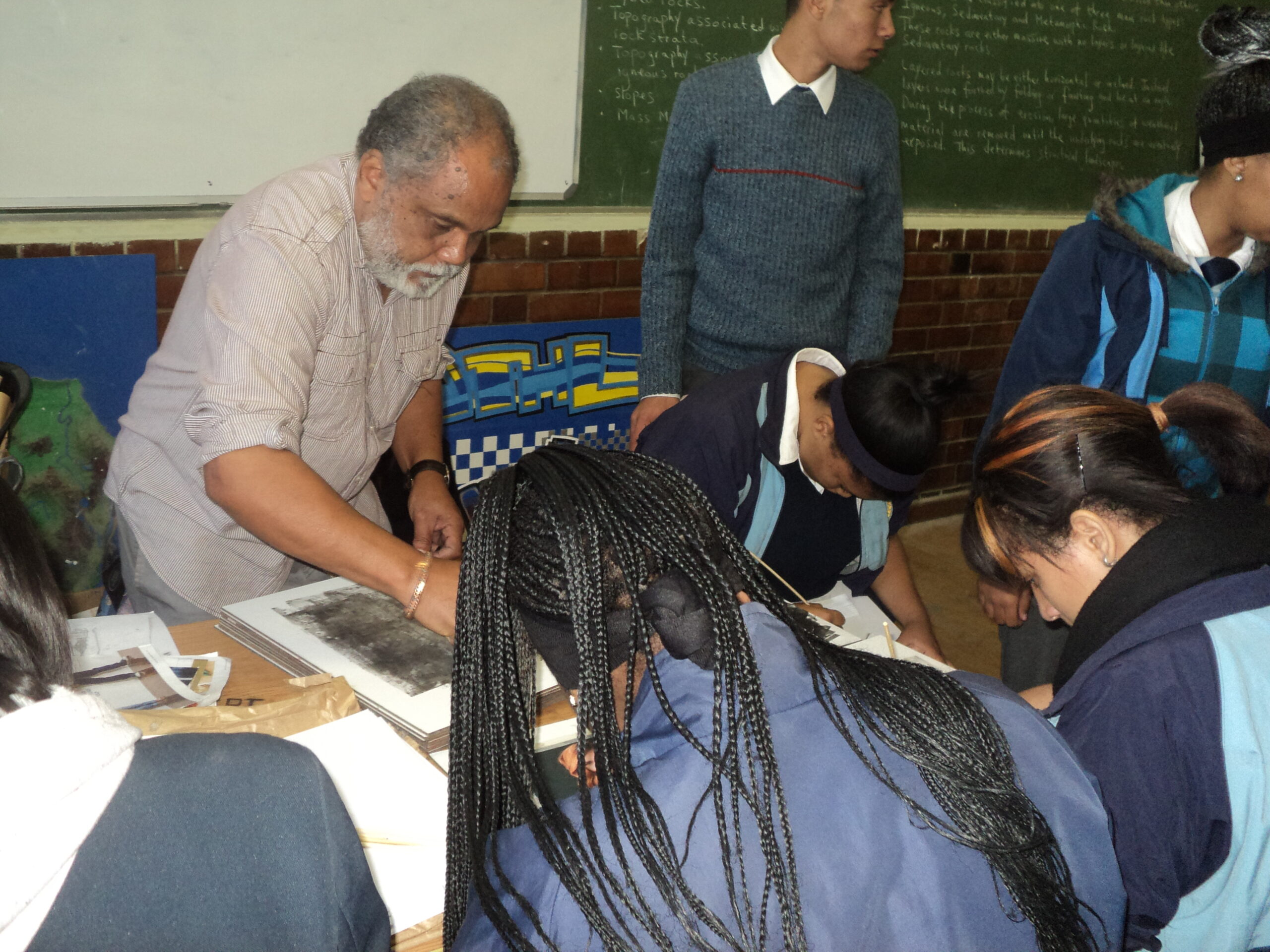
Reflections and Accomplishments
In addition to continuing to empower youth through Arts@school, Roderick serves as the head of the Department of Fine Arts at UCT. He is the first nonwhite appointee to the position, and actively works with faculty and students to “decolonize the mind” through teaching methodologies and curricula. He works with students to understand how viewpoints have been colonized and why it is important to address this to change social and cultural values in South Africa. Most of this work has been at UCT or local museums, and he also has collaborations with institutions outside South Africa.
IFP Fellow 2005–2007 | Master’s in Renewable Energy & Energetic Efficiency, Universidad de Zaragoza
Background and Motivation
Growing up in a Zapotec Indigenous community in Mexico, one of the poorest regions of the country, I witnessed firsthand the challenges of my family and community due to limited access to essential services. Our circumstances made it nearly impossible for us to access fundamental rights like healthcare, education, and an environment free from discrimination.
When I was six, my parents enrolled me, along with my siblings, cousins, and other relatives, in Albergues Indígenas (boarding schools for Indigenous students in Mexico) so we could attend school. I pursued education in these semi-free public institutions. After completing my degree in Agricultural Engineering, I worked in various Indigenous communities, identifying a pressing need for improved access to energy. I became interested in applying renewable energies as an energy alternative that could improve access to electricity in Indigenous communities, many of which were distant from conventional power grids. In addition, these energy sources could be used for cooking food, improving health and education, and promoting productive projects. Recognizing the potential of renewable energy solutions, I sought further education in this field.
The nascent state of education in renewable energy in Mexico during the early 2000s prompted me to seek education abroad. The high costs of education abroad made a scholarship essential. I applied for the Ford Foundation International Fellowships Program for students from Indigenous communities and received the award on my second attempt.
IFP Experience: Professional and Personal Impact
Given the limited access to decent employment and decision-making opportunities faced by Indigenous people in Mexico, my IFP experience was instrumental in my professional development. IFP significantly impacted my personal and professional growth. It broadened my horizons, strengthened my emotional resilience, and taught me to delve deeper into complex issues. I gained a global perspective, developed a strategic mindset, and became a catalyst for positive change.
Professionally, IFP equipped me with valuable knowledge and skills, empowering me to advocate for marginalized communities. I gained credibility and confidence as a facilitator, fostering dialogue and promoting collaborative solutions.
Before IFP, I worked multiple jobs to support my family, often facing payment delays and non-payment. IFP experience enabled me to secure leadership roles with international development organizations like the UNDP, UN Women, and the ILO. I played a pivotal role in developing Mexico’s national plan for forest dendroenergy and coordinated a project promoting rural forest microenterprises in 19 Indigenous communities. My work focuses on migration, self-employment, and social protection for vulnerable populations.
It has also given me an opportunity to promote personal projects related to the use of Indigenous languages in the digital sphere. While at the University of Zaragoza in Spain, I discovered advantages of open-source software. This led me to initiate and become a part of a group of digital activists dedicated to promoting the use of Indigenous languages on the Internet. I have led efforts to increase the use of Indigenous languages on the Internet, including electronic poetry in Zapotec.
Reflections and Accomplishments
Rather than simply applying what I have learned as a mere replicator, I believe that IFP Fellowship has provided me with the opportunity to address a pressing need in vulnerable communities: representation. For the longest time, the involvement of Indigenous community members in decision-making spaces was a complex and challenging issue. On the one hand, it was argued that they needed to gain the necessary skills, and on the other hand, their goals and perspectives often clashed with those of other stakeholders. In this context, I see my role as a bridge between these seemingly divergent entities.
I have applied my learnings to create significant changes. My work as a community partner and advocate has empowered vulnerable communities and promoted their inclusion in decision-making processes. I’ve contributed to digital activism, environmental education, and social justice initiatives. I am particularly proud of my role in establishing a powerful digital activism movement in indigenous languages. This movement has grown in numbers and expanded geographically, empowering indigenous communities in the digital age.
My work in international development projects has allowed me to represent and advocate for marginalized communities, ensuring their needs and perspectives are considered in global decision-making. My journey is a testament to the power of education and IFP’s impact on my life. I’m committed to continuing my work as a bridge between vulnerable communities and decision-makers, advocating for social justice and equity.
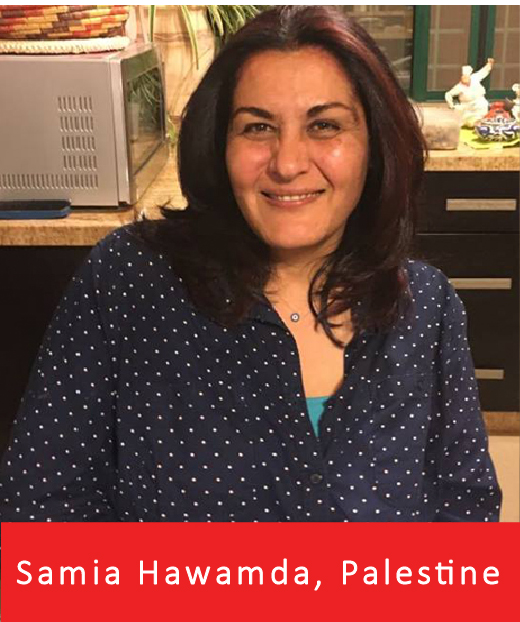
IFP Fellow 2003 | Master’s in Psychology, University of Jordan, Jordan
Background and Motivation
Born to a refugee family with nine siblings in Nablus, West Bank, Samia faced many financial barriers in her efforts to pursue her education. Thanks to the encouragement of her family, especially her mother, she was able to complete secondary school. However, the First Intifada put her post-secondary studies on hold for three years as she waited for the Israeli military to reopen universities in the West Bank. Eventually, Samia received her Bachelor’s degree in Psychology and was hired as a counselor working with women and refugees in Palestine.
IFP Experience: Professional and Personal Impact
Samia initially wanted to study sex education during her IFP fellowship, but because of pressures and rigid social norms in her conservative community, she chose to study psychology instead. The Second Intifada hurt the job market, so despite her new qualifications, Samia had difficulties returning to Palestine and finding work after IFP. She was unemployed for months and spent four years working outside her field before being hired as a counselor at the Women’s Studies Center in Nablus. Eventually she was hired by the Counseling Department at Birzeit University.
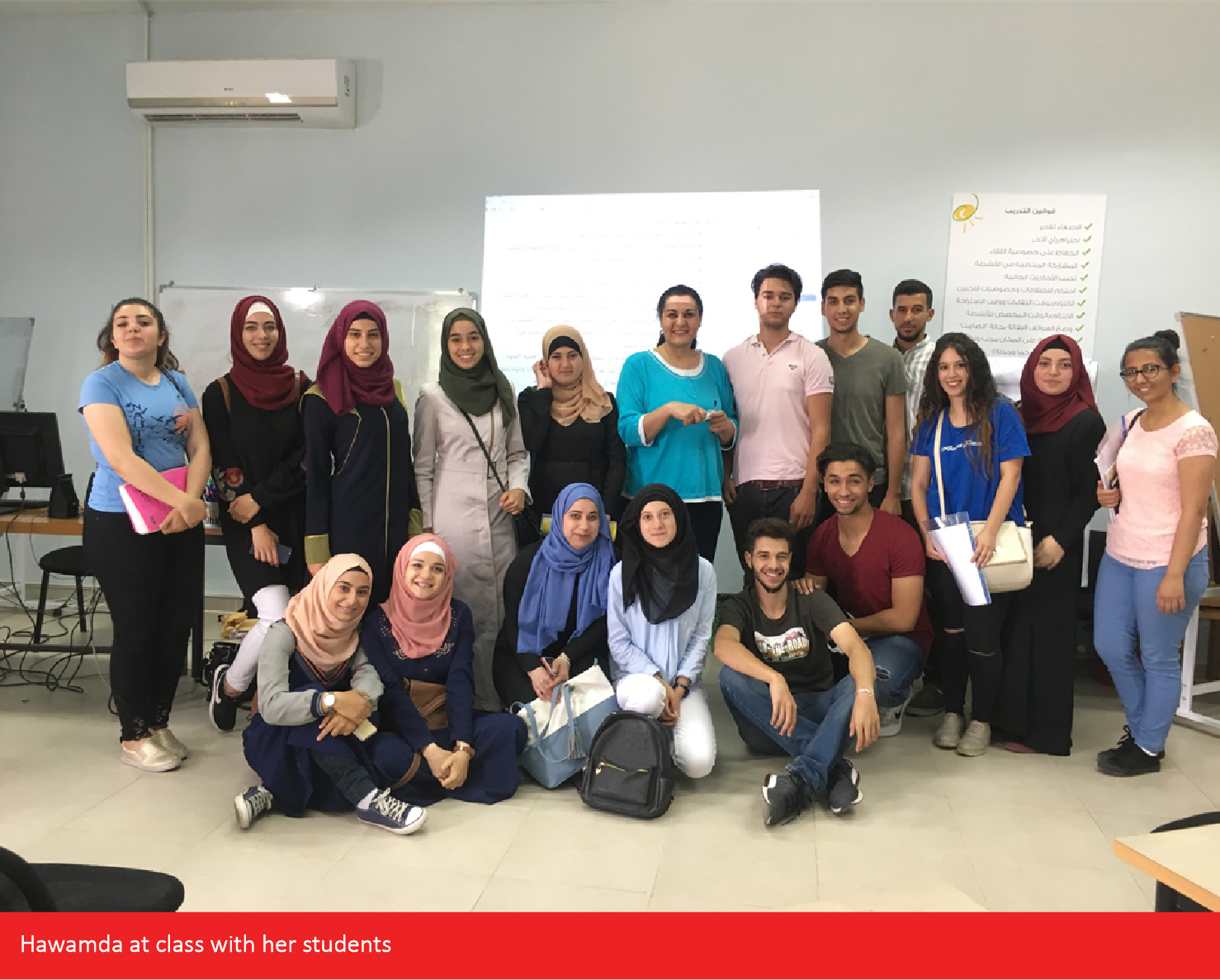
In her time at Birzeit, Samia has worked hard to open the department to students who suffer from social, psychological, and academic problems. The department has grown to support more than 13,000 students, an accomplishment Samia’s colleague attributes to her efforts: “There is no doubt that without Samia’s hard work and qualifications […] and the work of the rest of her team, none of this could have been achieved.” Samia has implemented several initiatives, including group counseling sessions for students and workshops on domestic violence, sexual assault, and reproductive health.
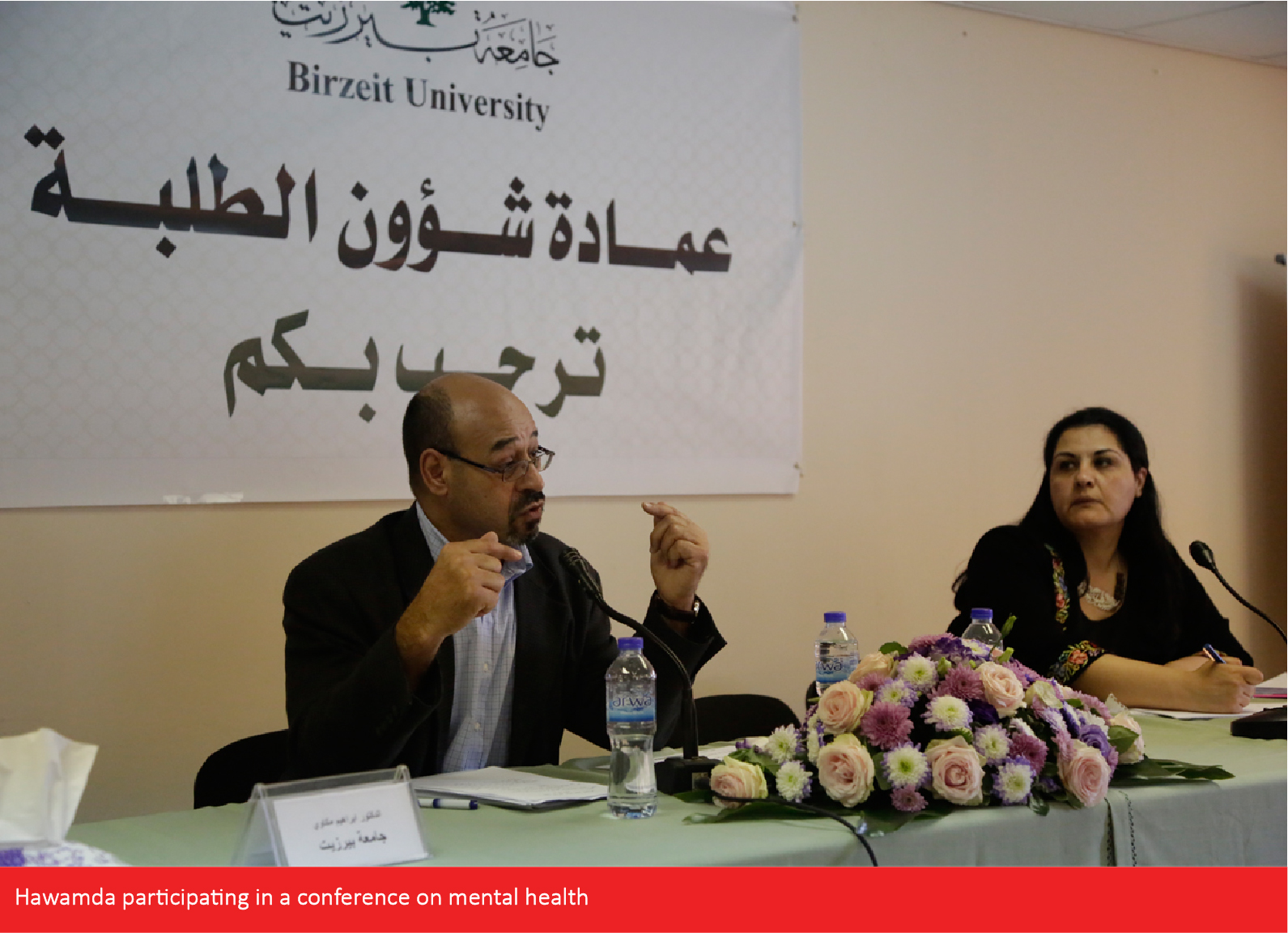
Reflections and Accomplishments
She leverages the network she gained during IFP to attract partners for her initiatives and increase the capacity of her department to better serve students. In addition to the capacity-building Samia has engaged in at her institution, she established an IFP-like scholarship for her students at Birzeit. Inspired by her own financial difficulties to accessing education and the IFP model, Samia worked with disadvantaged students attending Birzeit to find them financial support through her extensive networks in Palestine and abroad. She has, herself, financially supported students during their university studies. She has also extended her impact and commitment to education by continually working to provide resources and financial support to local refugee communities and schools.
IFP Fellow 2006–2008 | Master’s in Sustainable International Development, Brandeis University
Background and Motivation
Born and raised in a low-income family with very modest means, I never had an opportunity to seek admission to private schools or access quality education.
Despite several challenges, I completed my schooling at government schools in rural areas. I excelled in education and was able to qualify for the much sought-after engineering entrance exam of India (JEE) and secured an undergraduate degree in engineering. Driven by a desire to alleviate poverty and uplift downtrodden communities, I began working in Dholpur, in rural Rajasthan, focusing on women’s empowerment.
However, I felt limited by a need for more understanding of the socio-political and economic complexities behind these issues. Seeking to refine my skills and knowledge, I applied for the Ford Foundation International Fellowships Program. IFP provided me the opportunity to deepen my understanding of these crucial aspects, equipping me to approach development challenges with a more holistic perspective.
IFP Experience: Professional and Personal Impact
I believe one’s professional and personal life are two sides of the same coin; they cannot be separated.
IFP experience solidified my commitment to rural development, and I vowed to dedicate myself to improving the lives of those most vulnerable and bringing a smile to their faces. Despite the opportunity for higher-paying urban jobs, I chose to work in rural areas to make a difference in the lives of the most vulnerable. This decision has been life-changing, helping me appreciate the challenges encountered by those in underserved communities. Ultimately, the impact I have created is what motivates me to continue with my work.
IFP equipped me with valuable skills in log frame analysis, evidence-based interventions, statistical analysis, and development framework definition. These tools have become instrumental in guiding my work in policymaking
The program wasn’t solely about acquiring knowledge. The experience itself fueled personal growth and resilience. Facing the challenges of living abroad instilled a sense of purpose and a deeper appreciation for the impact I could create back home.
Reflections and Accomplishments
As planned, upon returning to India, I rejoined my previous organization, SRIJAN, in Dholpur, Rajasthan. Leveraging the knowledge gained through IFP, I began leading a team of over 30 professionals. Our focus shifted towards strengthening women’s institutions like federations, producer organizations, and cooperatives.
My dedication to women’s empowerment led me to establish the Manjari Foundation (www.manjarifoundation.in) in 2015. Over the past two decades, I have witnessed a remarkable journey—from a young professional to leading an organization impacting over 1.2 million rural people across 22 districts in four Indian states. Manjari Foundation has empowered over 1.2 million rural people and established 37 legally registered community institutions. We have also launched social enterprises like www.katori.co.in, www.graamhaat.com, and JHULKI, an umbrella marketing platform for rural artisans. Furthermore, I successfully replicated the Dholpur model in West Africa, mobilizing and empowering over 12,000 rural women in Mali and Senegal. Replication beyond national borders showcases the model’s potential for global impact.
My most significant accomplishments lie beyond statistics. Witnessing the smiles on people’s faces, the progress towards a more equitable society, and the empowered women shaping their families’ futures are the true rewards.
Background and Motivation
Sarita Sundari Rout was raised in a small, tribal community in Kalahandi, India. She received a Ford IFP Fellowship to complete a Master’s in Gender Analysis in International Development. Previously Sarita served the Government of Odisha as a Project Manager for the National Food Security Act of 2013, and she recently started working as a Senior Advisor to Valid India Trust. Through this role she is leading several policy changes in the state most of which target inequalities related to gender, health, class and ethnicity.
We spoke with Sarita about her background, policymaking efforts and thoughts about social justice in higher education. This conversation has been edited and condensed for clarity.
I lived in the Western part of my home state of Odisha, and it’s a disconnected region in terms of connectivity, but also very much different from the mainstream areas of the state due to its distinct cultural and socio-ethical practices. It’s in a very serious mountainous area where transportation and network connections are a challenge. Even access to public health is a big problem. It is resource rich but poverty stricken. That’s where I was raised and where I was working when I applied for the IFP fellowship.
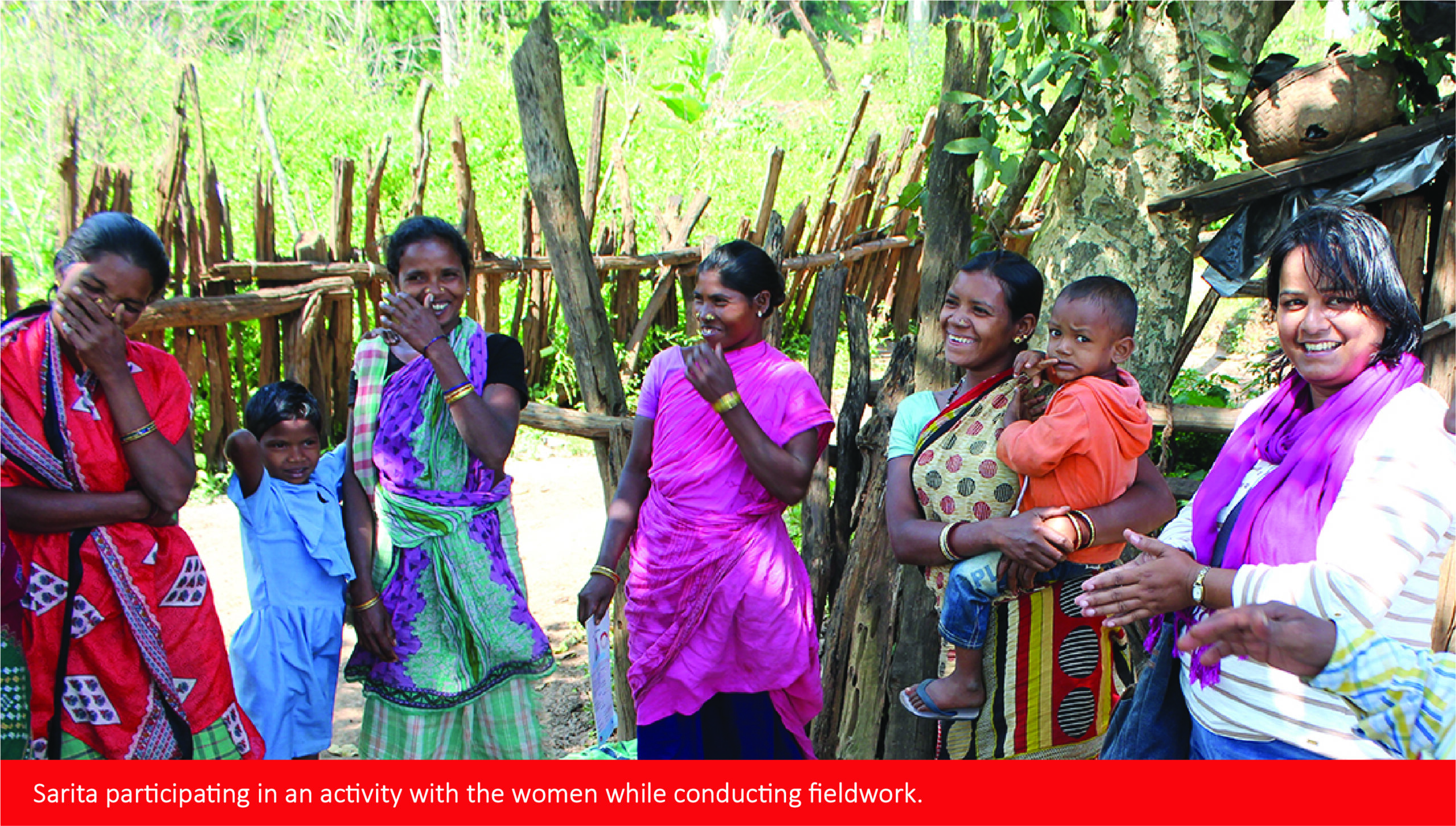
IFP Experience: Professional and Personal Impact
In one simple phrase, it’s because it was offering scholarship aid to study overseas. That was the main motivation. During that period, I was in a very rural area with no internet nor access to mobile phones. I was literally living in a world disconnected from everywhere, but which needed so much work to be done.
I am a very passionate human being when it comes to taking care of my people and community, but because of IFP I would say that my vision has broadened. My life in an international culture and community allowed me to learn about the inter-regionality of identities in order to achieve collective gains. Now, I can correlate these locally prevalent contexts with the global ones – you know, global vs. local.
I would say it has brought me much of the work that I do now, but I see my impact growing as I continue to work in communities with less monetary income. I feel the degree that I have earned from the United Kingdom will help me when I’m getting into senior manager positions, which I’m ready to transition into now.
Reflections and Accomplishments
Somebody can absolutely be a social justice leader without education, and that has already been evident in my country and elsewhere in the globe. But, by having exposure to higher education, it offers critical thinking to someone with experiences of working in multi-cultural settings. In my case, having spent the majority of my years in a residential school and then working in a highly difficult pocket of the country, my education gave me an edge.
Now I am able to focus more on tribal communities and their perishing culture. I wanted to mainly focus on displaced people and look at what sort of violence introduced displacement in their lives and how they can be helped through policy advocacy, and programming.
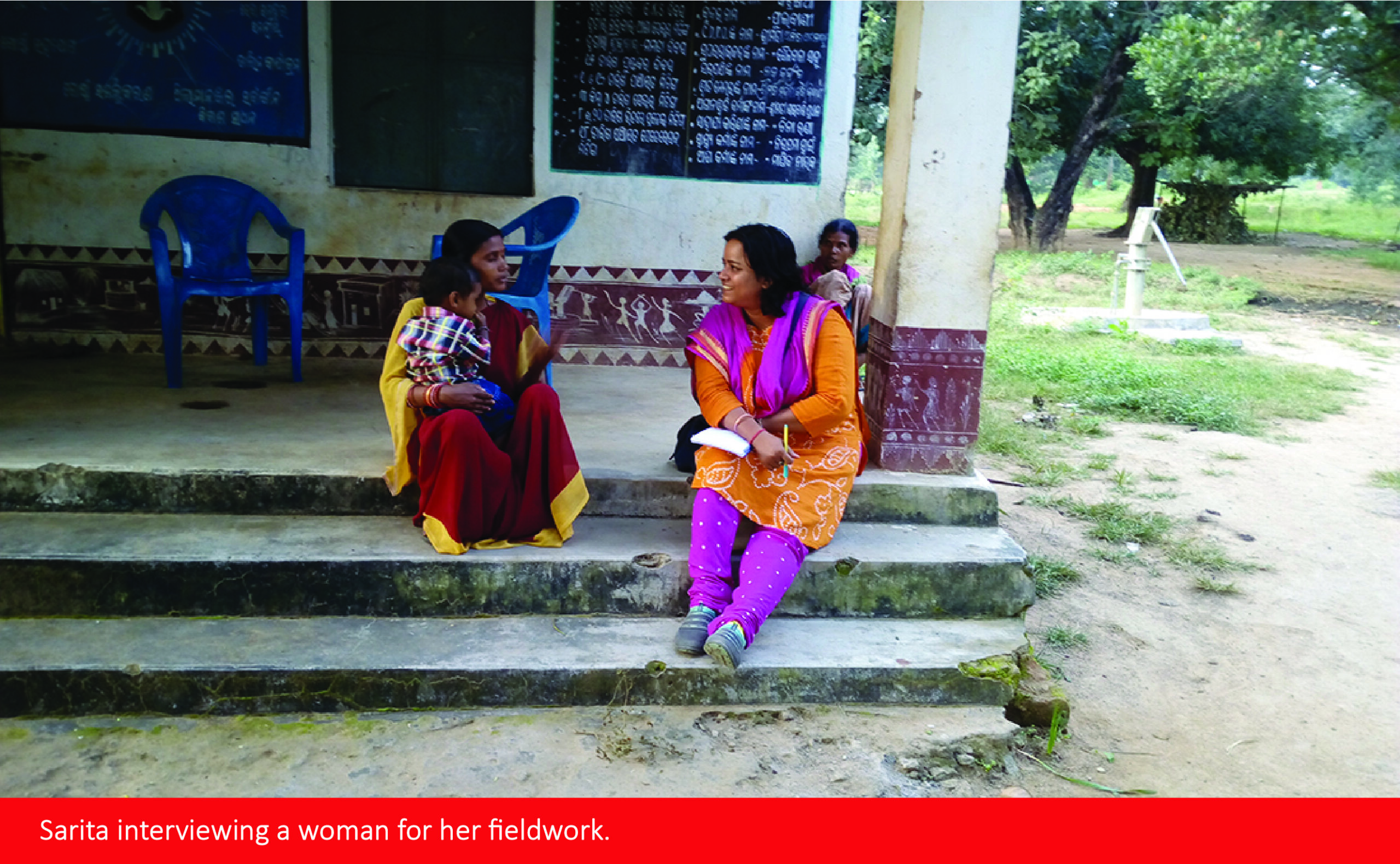
When I was working with the National Bank for Agriculture and Rural Development back in Mumbai, I was in charge of Mizoram, Northeast India. Northeast India is also very distant from mainland India, and the poverty issues there are prevalent despite having many natural resources. For example, even though the education level in Mizoram is at 97%, the highest in India, youth unemployment is very high.
My education has also prepared me for talking to bureaucrats. When you are going to challenge their established processes, you must be in a very strong and competitive position. How are you going to challenge highly educated people and the very community you work for, much less go in and demand anything, without an education? My graduate training not only helped me with the language, but also in my career in making decisions related to policymaking and policy-analyzing.
Background and Motivation
Sefakor Komabu Pomeyie was stricken by polio when she was eight years old. Despite the challenges she faced growing up, Sefakor remained committed to continuing her education and received a Ford IFP Fellowship to study Sustainable Development at the School for International Training (SIT). Today, she is a leading disability rights advocate and policy analyst in her home country, focusing on ensuring school accessibility for students with disabilities. In fall 2016, she will further her studies and commitment to social justice by starting a PhD program in Educational Leadership and Policy Studies at the University of Vermont, in the U.S.
We spoke to Sefakor about growing up in Ghana as a person with a disability, her reasons for pursing the IFP Fellowship, and how the fellowship has impacted her life and career. The conversation has been edited and condensed for clarity.
My disability happened when I was 8 years old. At the time the government was hoarding polio vaccines and I had received a vaccine that had expired. After I got polio, some of my family did not accept my disability, particularly my dad’s side. For many years I went through very difficult times undergoing so many medical treatments and physical therapy to help me walk again. Fortunately, my mom always believed in me and inspired me to go to school. She told me, “You can only survive through education. I know you can make it when you go to school for many years.”
I became more aggressive with advocacy work in college. In 2006, I fell down the stairs at my college and this caused me to speak out at my school about accessibility and how we suffer as people with disabilities. Inaccessibility is why most people with disabilities are not going to school. I started doing advocacy work through the media and one day when I was speaking on a television talk show someone called in and told me about the Ford IFP Fellowship. I immediately visited the website and realized I could do this advocacy work very professionally. That day happened to be the last day to apply but I managed to get all my materials together in time!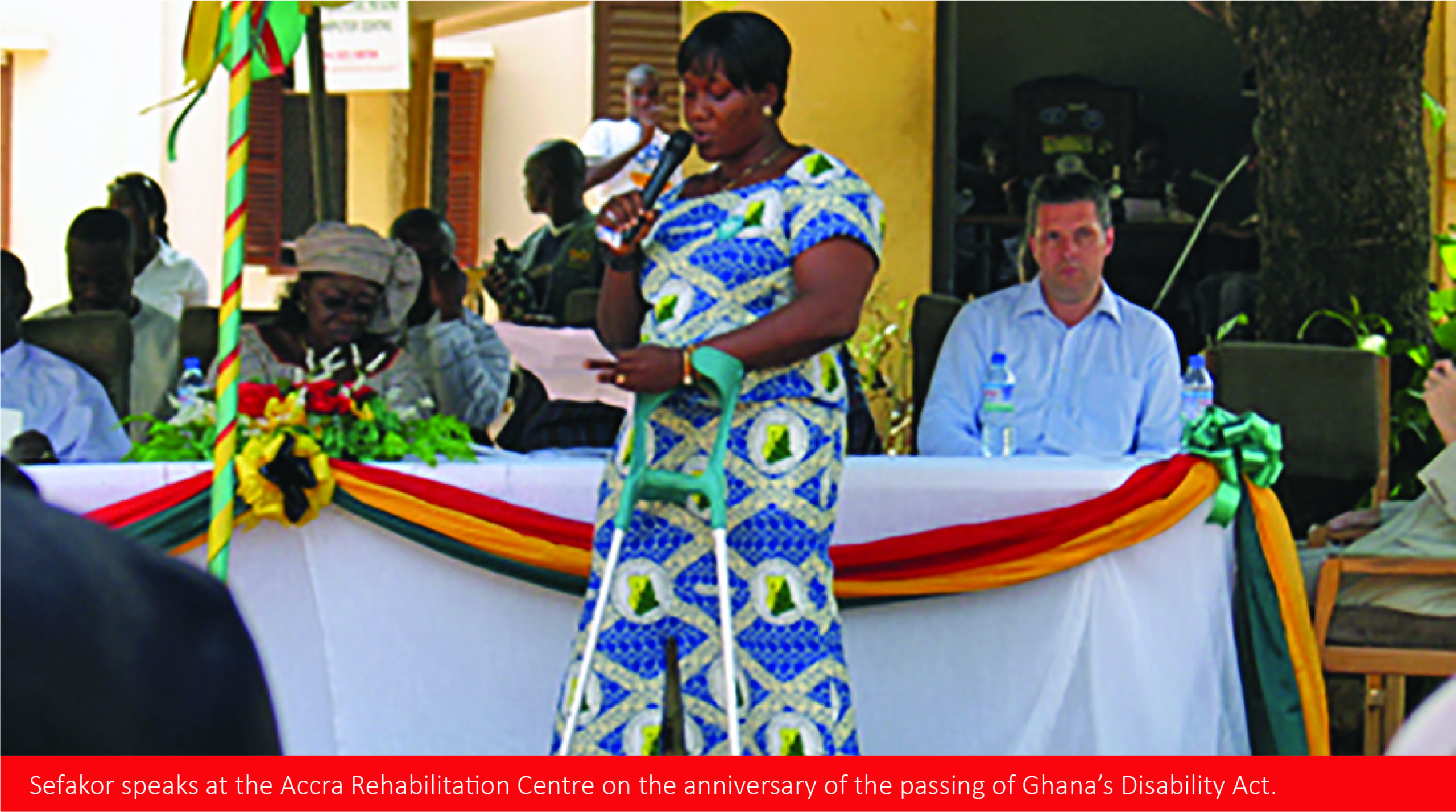
IFP Experience: Professional and Personal Impact
I was really surprised because I thought everything would be accessible in the U.S. But when I got to SIT I realized everything was not correct for me, especially the auditorium where we had all the big programs. There was absolutely no access for me. SIT is well-known for diversity, multiculturalism, and everything about social change, so I started talking with people about how they felt about my inaccessibility on campus and how I missed out on programs because of this. I did some research on campus with friends and professors and we came up with some policies to fix the accessibility issues. I had a big program-wide event called “Let’s Discuss the Taboo Topic, Which Is Disability,” and I opened it to the whole school to be a disability forum. I was the first person to come to the school in a wheelchair and I’m still helping SIT to be more inclusive as the African representative on SIT’s Global Advisory Board.
I won a $10,000 scholarship from SIT, which gave me the financial support to start my organization, Enlightening and Empowering People with Disabilities in Africa. Our focus is mainly to ensure that disability policy in Ghana is being implemented, although we are still actually fighting for it. The disability policies should be part of implementation processes, especially in every school. I still work as the resource person for the Ghana Education Service. Now I am also working for an NGO called the WaWa Project. They are using my Master’s thesis on accessible school environments to make a selected school in Ghana very accessible for people with any disability.
Reflections and Accomplishments
I gained a lot of useful personal experiences back in the U.S. I represented SIT at the 56thUN Convention on the Status of Women where I was part of an event on disability. I also did an internship at the Vermont Center for Independent Living and the Institute for Human Centered Design in Boston. Personally, I would say I’ve changed so many things, and they have grown. In my mind, a lot of critical analysis has taken place, a lot of reflective thinking, a lot of policy work has really gone through. I can talk about issues relating to people with disabilities very openly.
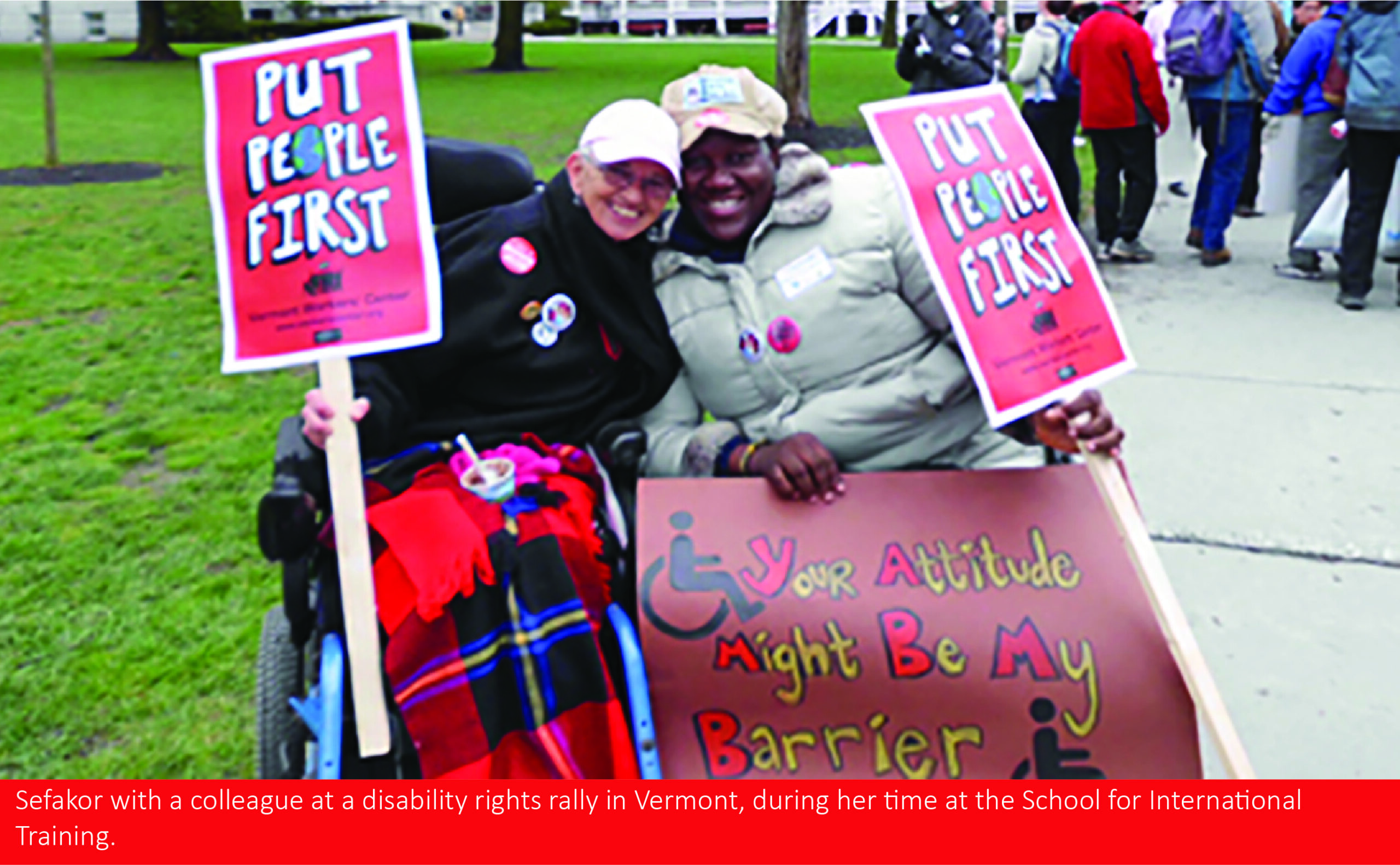
I ask myself this question always: “How do I make this really happen once and for all of posterity?” I’ve done policy analysis and advocacy. I’m a professional teacher. I’m working in the Ghana Education Service. But I don’t have control over policy implementation, which is still a huge issue in Ghana. I want to add value to myself so that I can make a great change, not only in my community here, but in Ghana as the whole.
In 2024, Sefakor provided additional context in a separate survey.
Background and Motivation
Being a woman with a physical disability, I’ve faced discrimination in all aspects of my life. Polio at eight marked the beginning of my trauma when my father abandoned us—he left a note saying he couldn’t live with me anymore. This neglect and societal exclusions in education, healthcare, transportation, and community life fueled my determination to create a more inclusive world where no other person with a disability would endure such suffering as I had.
As a French teacher in Ghana, I experienced further challenges due to my disability, including a fall from a lecture hall. This incident marked the beginning of my advocacy work on radio and TV, where I addressed pressing issues affecting people with disabilities despite existing policies. While my media advocacy was valuable, I felt the need to strengthen my academic credentials to pursue policy analysis and advocacy professionally. This led me to apply for the Ford Foundation International Fellowships Program to pursue studies abroad.
IFP Experience: Professional and Personal Impact
IFP has been a transformative experience for me, both personally and professionally. I’ve grown to embrace my disability wholeheartedly and use that confidence to empower youth with disabilities worldwide. My family is incredibly proud of my achievements, and I’ve been able to serve on numerous boards and committees in my community and internationally. IFP connected me with a community of change agents, including development workers, educators, researchers, policy analysts, advocates, and more. My interactions with IFP Fellows from other countries provided valuable knowledge and perspectives I wouldn’t have had access to otherwise.
IFP has been instrumental in my professional growth as a disability rights advocate, policy analyst, educator, and community influencer. I established Enlightening and Empowering People with Disabilities in Africa (EEPD Africa), a nonprofit organization focused on empowering people with disabilities in Africa. Our organization has gained global recognition and collaborates with other disability organizations worldwide.
Additionally, IFP experience has inspired me to contribute to higher education—I have developed and taught courses at the University of Vermont and Saint Michael’s College.
Reflections and Accomplishments
I’ve leveraged my IFP experience to drive positive change globally. Recognizing the negative connotations associated with disability in many cultures, I developed a new course, Global Disability Studies, at the University of Vermont. This virtual asynchronous course empowers students to dismantle ableist structures and advocate for change in their communities.
My higher education and learnings have also informed my policy analysis and advocacy work at the United Nations and community levels. I have published numerous articles and book chapters to contribute to the field of disability rights and advocacy. In addition to my advocacy and academic work, I serve on the board of several international organizations, working to bridge the gap between policy and practice. For instance, through my work with the Free Wheelchair Mission, I’ve helped provide wheelchairs to Ghana and other parts of Africa.
Beyond my professional accomplishments, I am proud to have launched my memoir, I’M ABLE. It challenges negative stereotypes about disability. I’ve also played a key role in establishing the Current Disability Center at the University of Cape Coast and co-founded the online International Disability Certificate program.
IFP Fellow 2009–2011 | Master’s in International Health and Development, Tulane University
Background and Motivation
Growing up in a community with limited healthcare access and stark disparities ignited my passion for medicine and public health. As a medical professional, I have had the privilege of witnessing the profound impact that healthcare and public health interventions can have on individuals and communities. I have also witnessed challenges and disparities within healthcare. My commitment to bridging the gap between service demand and limited resources motivated me to apply for IFP Fellowship, which offered an unparalleled opportunity to further my mission. The program brought together brilliant minds in public health and medicine, providing a unique platform to engage with diverse experts and learn from their experiences.
I applied to IFP to build connections and drive change through collaboration. The program’s structure aligned perfectly with my aspirations for leadership development and transformative change in healthcare systems. IFP’s network of professionals provided a unique platform for me to engage with diverse experts. The complex challenges within medicine and public health require individuals who are not only knowledgeable but also adept at leading and inspiring change. IFP’s focus on leadership development aligned perfectly with my aspirations to drive transformative change in healthcare systems.
Beyond professional and academic aspects, IFP’s emphasis on global perspectives was appealing. Having witnessed healthcare disparities worldwide, I understood the importance of a holistic understanding of public health and medical challenges. The program’s international exposure would equip me with the cross-cultural competencies needed to effect change in diverse settings.
In addition to these overarching motivations, I saw IFP Fellowship as a platform to refine and expand my skill set. The program’s diverse range of workshops, seminars, and experiential learning opportunities promised to deepen my understanding of best practices in public health and medicine. This knowledge, I anticipated, would be instrumental in developing innovative solutions to address the pressing healthcare issues facing communities around the world.
IFP Experience: Professional and Personal Impact
IFP has impacted my personal life significantly, leading to a transformative shift in my worldview, emotional management, and engagement with others. The program expanded my vision of the world, enabling me to view it through a more nuanced and empathetic lens.
One significant change was the expansion of my understanding of the world. Interacting with diverse professionals and witnessing different healthcare systems broadened my horizons, challenging my preconceived notions and fostering a greater appreciation for diverse human experiences. This newfound global perspective enriched my personal life and deepened my empathy and understanding.
IFP also profoundly impacted my emotional management. Engaging with complex healthcare challenges on a global scale requires emotional resilience. I learned to navigate high-stress situations with greater composure and adaptability. The exposure to diverse perspectives and heart-wrenching stories of healthcare disparities reinforced my commitment to making a positive change, and this commitment became a source of strength and motivation.
Moreover, IFP taught me to see beyond surface-level problems and analyze underlying principles. This shift in perspective has had a ripple effect on my personal life. I now approach challenges with a more profound understanding and a strategic mindset. Whether it’s addressing personal obstacles or tackling complex societal issues, I’ve learned to identify root causes, patterns, and devise sustainable, impactful solutions.
One of the most profound transformations in my personal life resulting from IFP experience has been my evolution into an enabler who seeks to bring out the best in others. Through interactions with fellow participants and mentors, I witnessed the power of mentorship, support, and empowerment. I realized the significance of uplifting others and fostering an environment where everyone can thrive. This realization has translated into my personal life as well, as I strive to be a source of encouragement and support for friends, family, and colleagues. I’ve become more attuned to recognizing the potential in others and facilitating their growth and development.
IFP provided me with access to the most up-to-date knowledge in the world of public health and medicine and facilitated personal connections with professionals at the forefront of my field. Through workshops, seminars, and interactions with renowned experts, I gained insights into emerging trends, best practices, and novel strategies for addressing healthcare disparities. These two aspects, knowledge acquisition, and networking, have significantly impacted my career trajectory.
First and foremost, IFP experience revolutionized my approach to knowledge acquisition. The program exposed me to cutting-edge research, innovative practices, and the latest developments in public health and medicine from a global perspective. Through workshops, seminars, and interactions with renowned experts, I gained insights into emerging trends, best practices, and novel strategies for addressing healthcare disparities. The program’s network connected me with experts, thought leaders, and change-makers who were shaping the landscape of public health and medicine and were also deeply committed to effecting positive change. These invaluable personal connections allowed me to engage in meaningful dialogues, seek guidance, and foster collaborations. IFP has expanded my horizons, challenging me to think critically and creatively about the worldwide complex challenges that healthcare systems face.
Reflections and Accomplishments
The skills I obtained from IFP primarily encompass soft skills, which I have been actively applying in various aspects of my professional and personal life since completing the fellowship. While they may not be as tangible as the technical skills I acquired, soft skills are instrumental in effective leadership, communication, and collaboration.
What I am most proud of in my work, whether it’s in my professional capacity or through volunteerism, is the tangible and positive impact I’ve witnessed on the lives of individuals who have utilized the services I’ve provided. This has been the most fulfilling outcome of my IFP journey.
Inspired by Mahatma Gandhi’s words, “Be the change that you wish to see in the world,” I strive to effect meaningful change and witness improvements in people’s lives.
IFP Fellow 2009–2012 | Master’s in Vision Studies, University of Pittsburgh
Background and Motivation
Growing up blind in a remote part of Uganda presented significant challenges. Limited access to education and resources left me feeling isolated and without a clear path forward. Having managed to train as a teacher, I was assigned to schools in the outlying areas of Teso and Amuria. Working in these areas, especially during the LRA rebellion, was a challenging experience. The Internet and mobile phones were luxuries exclusive to urban centers. Infrastructure was lacking, with limited transportation options and frequent flooding.
Despite these obstacles, I remained determined to improve my life. I pursued a teaching career but felt confined by traditional methods that focused on memorization rather than engagement. My desire for growth was further fueled by supportive friends who encouraged me to apply for the Ford Foundation International Fellowships Program. Their encouragement and belief in my abilities were crucial in my decision to apply. IFP represented an opportunity to break free from my limitations.
IFP Experience: Professional and Personal Impact
My time at the University of Pittsburgh’s Vision Studies program was transformative. It equipped me with valuable skills and knowledge that have propelled me professionally and personally. Earning awards like the Chesler Award, New Man Sally Intergenerational Award, Sheth International Young Alumni Achievement Award, and the University of Pittsburgh’s Distinguished Alumni Award bolstered my confidence and brought recognition to my work.
IFP connected me with a global network of colleagues and friends who provided invaluable support during my studies and beyond. This support system extended to the Ssebo family, an American family who welcomed me as one of their own.
IFP Fellowship transformed my approach to teaching. I transitioned from relying solely on lectures to incorporating child-centered methods that foster engagement and critical thinking. Technology, including specialized computers with JAWS software, has also become integral to my instruction. My career opportunities have expanded vastly after my IFP experience—once an Assistance Education Officer, I now hold a prestigious position as a Lecturer in Special Education at Kampala International University. Additionally, I contribute to national efforts by conducting university program assessments for accreditation and working as a Braille transcriber for the national examinations board.
Before IFP, further education felt impossible. Now, I am driven to pursue a doctoral program and transform my school, SMILE, into a University of Special Education.
Reflections and Accomplishments
IFP Fellowship has equipped me to make a lasting impact. I no longer impart knowledge but actively promote skills and knowledge application, aligning my teaching with the UN Sustainable Development Goals (SDGs).
Driven by my own experiences, I co-founded SMILE, a school in the heart of Soroti District, Uganda. This school caters to the educational needs of children with disabilities, offering Braille instruction, daily living skills development, White Cane usage training, and a curriculum aligned with the Ugandan education system. IFP connected me with a global network of friends and supporters who have been instrumental in the success of SMILE (www.silverkidsuganda.org and www.vcaya.org). SMILE boasts a thriving Braille transcription department that provides accessible learning materials for blind students.
I required assistance with daily tasks like reading, cooking, and laundry before joining IFP Fellowship. Thanks to my training at the Blind and Vision Rehabilitation Services of Pittsburgh, I can now navigate these tasks independently, using tools like the White Cane and JAWS software on computers. For me, IFP shattered the myth that blindness precludes computer use. I now confidently utilize computers to manage emails, complete assignments, and even teach others with visual impairments. Additionally, I have provided training in computer skills and orientation and mobility for those who need it most.
Beyond SMILE, my networks continue to fuel change. Collaborations with professors from the University of Pittsburgh and Carlow University have provided clean drinking water to Ugandan villages and rehabilitation opportunities for victims of human trafficking. These successes stemming from my IFP experience provide immense satisfaction and motivate me to continue making a positive difference.
IFP Fellow 2011–2013 | Master’s in Work and Social Politics, Universitat Autònoma de Barcelona
Background and Motivation
I applied for the scholarship because I lacked the financial resources to continue my studies. Moreover, I had always felt a strong need to fight against social inequalities and sought the tools to strengthen my commitment to social justice. Growing up in a vulnerable family that was politically persecuted during the military dictatorship shaped my social and political context. My grandfather and uncle were detained and disappeared, and half of my family was forced into exile.
Living in a vulnerable community and being a single mother, coupled with the challenges of securing financial support, prevented me from pursuing a master’s degree. During those years, I worked as a teacher in one of the 900 poorest schools in Chile.
I was a student at the first school for single mothers in Chile. This school allowed us to attend classes with our children, fostering a deep love for my daughter. As a single mother, many doors were closed to me. Without an external support network, I struggled to acquire the tools necessary to advocate for better education in Chile. This school allowed me to finish my studies and obtain my high school diploma. Afterward, I began working to support myself and my daughter and enrolled at the Universidad Tecnológica Metropolitana to pursue higher education as a General Basic Education Teacher.
I always felt a calling to contribute to education. Living in a vulnerable community allowed me to recognize the significant educational gap in my country and the disparities in terms of inequality and access to quality education. This motivated me to study to become a teacher. As a student leader at the university, I observed the educational inequality in Chile and understood the realities of different environments and contexts where inequality was prevalent.
My experience as a teachers’ union representative and community leader highlighted the local educational disparities. I realized the need for tools to create positive change in my community. In 2009, I sought a scholarship to specialize, as I couldn’t afford a master’s degree. IFP was a turning point. In 2010, I was dismissed from my teaching job for my union leadership and left-wing political beliefs. However, in August, I learned I had won the scholarship, providing an opportunity to address the social inequalities I had experienced as a teacher in disadvantaged schools.
IFP Experience: Professional and Personal Impact
IFP transformed my life, my daughter’s, and my family’s. As the first in my family to earn a higher degree, I inspired my daughter and relatives. The scholarship improved our lives and empowered me to continue fighting for social justice.
Professionally, IFP empowered me to contribute to education at a higher level. I built support networks, made a regional and national impact, and became a recognized leader in the field. I was invited to the 3Xi event as one of the 150 most influential people in the Los Lagos region.
I continue to advocate for human rights and social justice, empowering my leadership. This opportunity has been life-changing, providing a network that supports our fight for better education. I believe this scholarship contributes significantly to society by empowering agents of social change. Thank you, IFP, for seeing, accepting, empowering, and believing in me.
IFP also shifted my career path. I had always been a classroom teacher, but the scholarship allowed me to train and acquire new skills. Upon returning to Chile, I began working at a public school in a high-risk neighborhood. I successfully implemented a curriculum strategy that improved students’ reading skills, leading to a position in the Curriculum area.
I continued to seek new challenges, applying for public positions in rural areas. I specialized in educational leadership and became the Head of the Technological Pedagogical Unit at the Departamento de Administración Municipal de Educación (DAEM, Department of Municipal Education Administration) of the Hualaihué commune in Los Lagos region in Chile. This experience exposed me to a different context with significant educational disparities. I have devised a fieldwork methodology to improve teachers’ access to higher education, create community networks, enhance student learning, and strengthen territorial identity. I facilitated university training for teachers in the commune, partnered with the Food and Agriculture Organization on environmental education, engaged with Mapuche community educators, and formed a collaborative relationship with the Universidad Católica de Valparaíso. I also initiated the Tejiendo Saberes (Weaving Knowledge) meeting to encourage inter-communal networks among teachers.
Reflections and Accomplishments
I have applied my learnings to create and generate significant changes. In the educational field, I have empowered an equity in education that focuses on recognizing the environment and considering the context for teaching. I have achieved that teachers can teach in place-based education, fostering collaborative work and creating communal and regional cooperation networks. Additionally, I have influenced local policies by creating a communal work plan based on fieldwork.
I am proud to be part of and contribute as a community partner to the first national certification program in education and climate change offered by the Universidad Católica de Valparaíso and to enable teachers in the community to access this tremendous opportunity for free. Also, bringing university-level training to the community for the first time marked a before and after in community education, as it has opened doors for teachers to access numerous training opportunities that allow them to develop professionally and enhance their career paths. I am proud to see my colleagues grow and empower themselves in their needs and those of their schools. I am thrilled to be a key player in the development of intercultural education in the community. This has been tremendously significant for the local ethnic identity.
